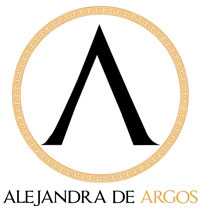- Details
- Written by Elena Cué
The Swedish philosopher is one of the most influential in the field of superintelligence. He is the director of the Future of Humanity Institute at the University of Oxford. Transhumanism explores the possibility of improving physical, emotional and cognitive human condition through scientific and technological progress. I speak about this intellectual, scientific and cultural movement with philosopher Nick Bostrom (Sweden, 1973), founder of the World Transhumanist Association together with David Pearce and one of the most influential thinkers in the field of superintelligence. He is also the director of the Future of Humanity Institute and the Governance of Artificial Intelligence Program at the University of Oxford. He is the author of more than 200 publications, "Human Enhancement" and "Superintelligence: Paths, Dangers, Strategies", bestseller of the “New York Times” and strongly recommended by Bill Gates and Elon Musk.
Author: Elena Cué
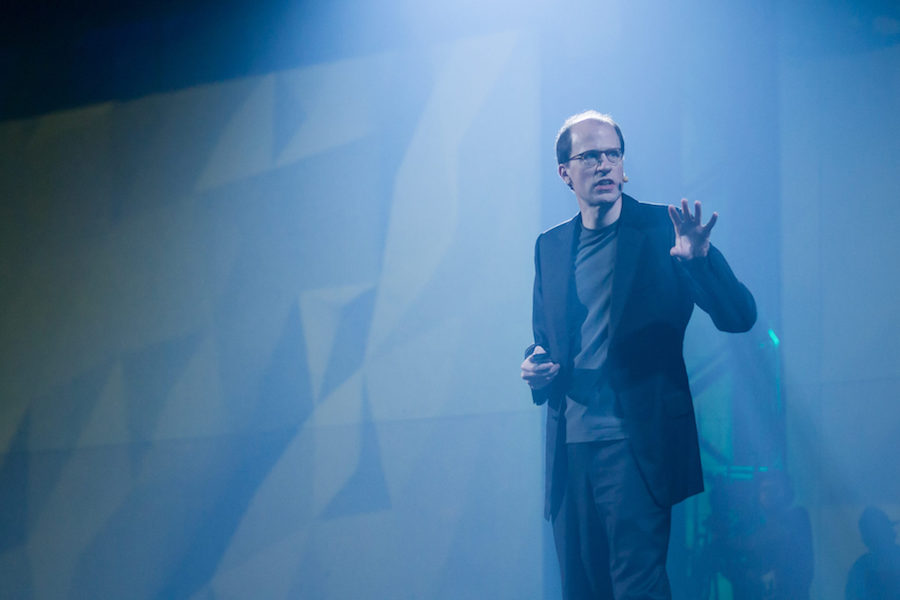
Nick Bostrom. Photo: Allen McEachern
The Swedish philosopher is one of the most influential in the field of superintelligence. He is the director of the Future of Humanity Institute at the University of Oxford.
Transhumanism explores the possibility of improving physical, emotional and cognitive human condition through scientific and technological progress. I speak about this intellectual, scientific and cultural movement with philosopher Nick Bostrom (Sweden, 1973), founder of the World Transhumanist Association together with David Pearce and one of the most influential thinkers in the field of superintelligence. He is also the director of the Future of Humanity Institute and the Governance of Artificial Intelligence Program at the University of Oxford. He is the author of more than 200 publications, "Human Enhancement" and "Superintelligence: Paths, Dangers, Strategies", bestseller of the “New York Times” and strongly recommended by Bill Gates and Elon Musk.
What led you to create the World Transhumanist Association?
Well, it happened in the 90s. At that time, it seemed to me that there was no adequate forum to discuss the impacts of the emergence of future technologies and how they may affect the human condition. Back then, the emphasis was mainly on the negative. Most of the relevant topics were not discussed at all and the few discussions on academic bioethics always focused on the inconveniences, such as possible dehumanization by using technology to enhance human capacities. There needed to be another voice. The association was an attempt to create a platform which fulfills this demand.
And what about today?
I have not been involved for many years. In the early 2000s, these problems found a voice and were developed in the academic field. Thus, the organization was no longer a necessity.
There is talk about artificial intelligence attempting to develop a conscious intelligence in order to learn in the same way humans do. What can you tell us about this?
I think that a lot of the excitement over the last eight years is due to advances in deep learning; which is a particular focus of AI. This way of processing information is, in many ways, similar to how our human mind works. Excitement is created because it seems to be a more "general" way of structuring intelligence, a type of algorithm that has the general ability to learn from data (big data), learn from experience, and build representations from a pattern present in such data that has not been explicitly pre-programmed by humans. This new concept points to Artificial General Intelligence (AGI).
Can you give an example?
The same algorithm that can learn to play one Atari game can learn to play other Atari games. With small modifications, it can learn to play chess, Go, how to recognize cats in images and to recognize speech. Although there are limits to what can be done today, there are indications that we might be reaching the type of mechanism that provides similar flexibility to that of human intelligence, a type of general learning capacity.
Some voices are more skeptical.
If you look at the systems that are used in the industry, they are still a kind of hybrid. In some cases, these modern deep learning systems are specifically used for image and voice recognition, but many other systems employed by companies continue to be mainly expert systems with a domain specific purpose while following the old school model. This contributes to the confusion.
When do you think molecular nanotechnology will exist, making it possible to manufacture tiny machines that could be inserted into our organisms and thus eradicate many diseases and prolong life?
It's a good question... I believe that nanotechnology will probably be viable after the development of artificial superintelligence. The same goes for many other advanced technologies, which could be developed by using superintelligence for research and development. However, there could be a scenario in which molecular nanotechnology is developed before artificial intelligence takes off. In that case, the first applications would present risks that we would have to survive and if we succeed, we would have to survive the risks associated with superintelligence, once it is developed. Therefore, if we were to be able to influence the order of the development of both technologies, the ideal goal would be to obtain superintelligence before molecular nanotechnology.
Another way to prolong life would be through cryonics. More than 300 people have their bodies cryogenically frozen or their brains preserved in nitrogen. You registered for this service, what prompted you to do so?
Actually, in the interactions I have had with the media, I have never confirmed I did. My stance has always been that my funeral arrangements are a private matter. I know there have been speculations in a newspaper two years ago... It is also true that some of my colleagues are cryonics clients, and they have made it public, like Dr. Anders Sandberg, who is one of our researchers here.
With cultural diversity and different moral codes worldwide, how can we reach a global consensus on ethical limits in genetic research?
For the moment, humanity does not really have a single coordinated plan for the future. There are many different countries and groups, each one pursuing its own initiatives.
From what you say, foresight is essential.
If you think about the development of nuclear weapons 70 years ago, it turned out it was hard to make a nuclear bomb. You need highly enriched uranium or plutonium, which are very difficult to get as you would need industrial sized power plants in order to make them. In addition to that, a huge amount of electricity is needed, so much so that you could see it from space. It is a hard process. It is not just something you could do in your garage. However, let us suppose that they had discovered an easy way to unleash the energy of the atom; that might then have been the end of human civilization as it would have been impossible to control.
It is worrying to think.
Yes, it would be in these cases that perhaps humanity would have to take steps to have a greater capacity for global coordination in case such vulnerability arises or a new arms race emerges. The more powerful our technologies are, the greater the amount of damage we can cause if we use them in a hostile or reckless manner. At this point, I think this is a great weakness for humanity and we just hope that the technologies we discover do not lend themselves to easy, destructive applications.
Recent studies have shown that graphene can effectively interact with neurons. What do you think about the advances in the development of brain-machine interfaces (communication zones) that use graphene?
It is something exciting from the point of view of medicine and people with disabilities. For patients with spinal cord damage, it has several promising applications such as the neuro-prosthesis. However, I am slightly skeptical that it enhances the functionality of a healthy person sufficiently to make it worth the risks, pains and problems of a surgical intervention.
Do you think it is not worth it for a healthy person?
It is quite hard to add functionality to a healthy human mind that you could not get, in a similar way, by interacting with a computer outside of your body, simply typing things on a keyboard or receiving inputs through your eyeballs by looking at a screen. We already have high bandwidth input and output channels to the human brain, for instance, through our fingers or through speech. It is much more relevant to find a solution to how to access, organize and process the vast amount of information available with the limitations of the human brain. That is the bottleneck of the problem and it is where the focus of the development should lie.
In your book Superintelligence you comment that the artificial intelligence research project begins at Dartmouth College in 1956. Since then there have been periods of enthusiasm and regression. At present, it seems that the biggest advocate for the creation of a post-human AI is Ray Kurzweil, founder of Singularity University and financed by Google. Do you think they will achieve their objective this time?
I do not think Ray Kurzweil is the leader in research of AI. There is a big global research community with many important people making significant contributions and I do not think he plays a significant part in most of them.
Would such research be aimed at replicating the human brain including consciousness?
Artificial intelligence is mainly about finding ways to make machines solve difficult problems. Whether they do so by emulating, assimilating, or drawing inspiration from the human brain or not, is more of a tactical decision. If there are useful insights that can be extracted from neuroscience, they will be taken advantage of, but the main objective is not to try to replicate the human mind.
I thought a posthuman project already existed…
If you are referring to the Human Brain Project, then yes. It might be a little bit closer to trying to emulate various details and levels of the human condition. I have the impression that it initially began with a very ambitious vision and probably excessive expectations, with very detailed models of a cortical column. However, after several dissonant voices, it has become a funding channel for several neuroscience projects.
You mentioned that with superintelligence (on a human level) we can obtain great results but at the risk of human extinction.
I think superintelligence would be a kind of general-purpose technology, because it would make it possible to invent other technologies. If you are super intelligent, you can do scientific or engineering work much faster and more effectively than human scientists and engineers can. So imagine all the things that humans could achieve if we had 40,000 years to work on them; perhaps we would have space colonies, upgrades in our organism, cures for aging and perfect virtual realities. I think all of these technologies, and others we have not thought of yet, could be developed by machines of superintelligence and perhaps within a relatively short amount of time after its arrival. It gives us an idea of the vast amount of potential benefits.
What would be the “existential risks” we would face with artificial intelligence?
I see two types of threats. The first one arises from a failure to align objectives. You are creating something that would be very intelligent and powerful at the same time. If we are not capable of finding a way to control it, we could give rise to the existence of a super intelligent system that might prioritize attaining its own values to the detriment of ours. The other risk is that humans use this powerful technology in a malicious or irresponsible way, as we have done with many other technologies throughout our history. We use them not only to help each other or for productive purposes, but also to wage wars or to oppress each other. This would be the other big threat with such advanced technology.
Stephen Hawking called for “expansion to space” and Elon Musk’s company Space X expects to send people to Mars in the near future. What do you think are the reasons we will be forced to migrate to other planets? Could humans live on Mars?
At this moment in time, Mars is not a good place to live. A meaningful space colonization will happen after superintelligence. In the short term, it seems very unattractive; it will be easier to create a habitat at the bottom of the sea or on top of the Himalayas than to do it on the Moon or Mars. Until we have exhausted this type of places, it is difficult to see the practical benefit of doing so on Mars. However, in the long term, space is definitely a goal; Earth is a small crumb floating in an almost infinite expanse of resources.
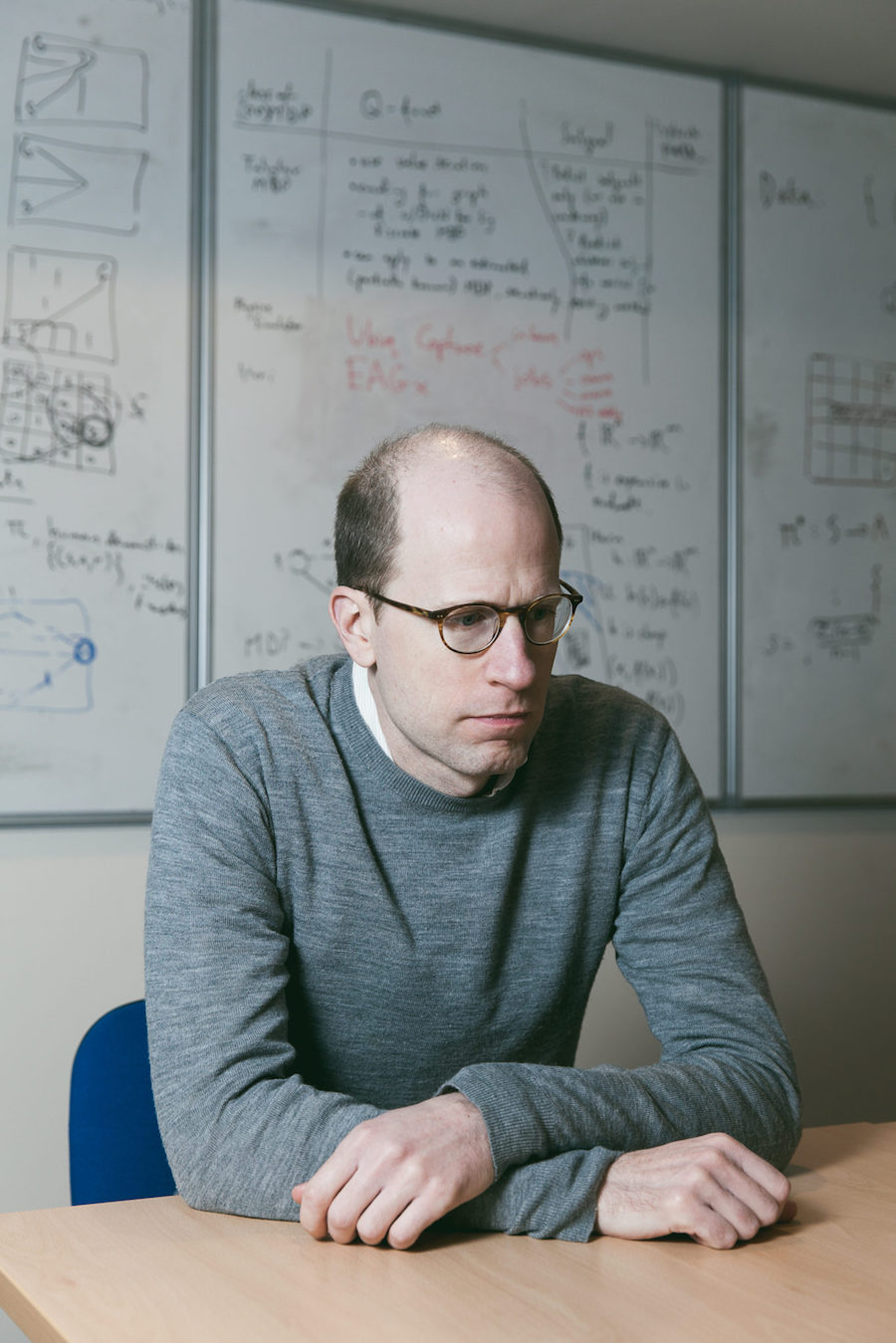
Nick Bostrom
- Details
- Written by Elena Cué
With twilight beginning to fall on the little French village of Barjac, I began my tour of La Ribaute ~ 40 hectares of the German artist Anselm Kiefer's making ~ which would conclude at sunset the following day without me having managed to visit all the towers, over and underground tunnels, crypts in a permanent state of transformation, an amphitheatre and pathways planted with sculptures that make up this extraordinary place, a place that is emotive for its grandeur, for its limitless space and for its eerie mystery.
Author: Elena Cué
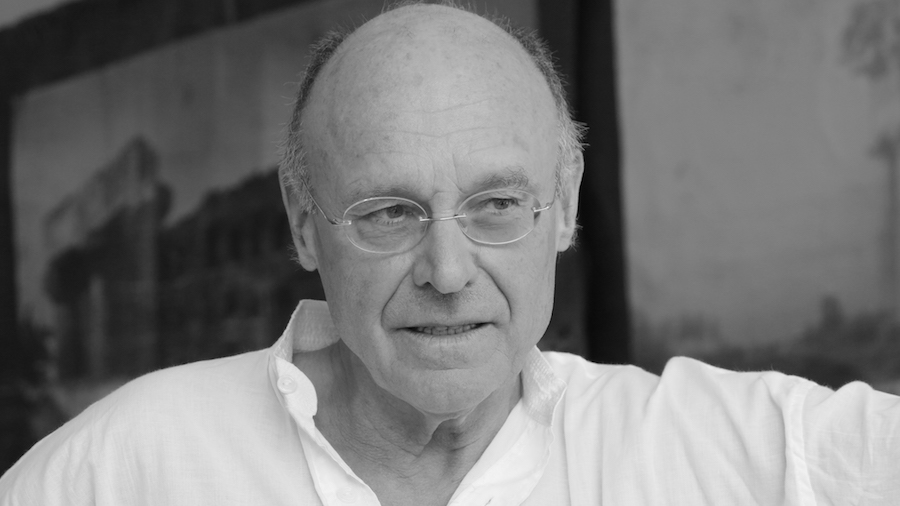
Photograph: Waltraud Forelli
With twilight beginning to fall on the little French village of Barjac, I began my tour of La Ribaute ~ 40 hectares of the German artist Anselm Kiefer's making ~ which would conclude at sunset the following day without me having managed to visit all the towers, over and underground tunnels, crypts in a permanent state of transformation, an amphitheatre and pathways planted with sculptures that make up this extraordinary place, a place that is emotive for its grandeur, for its limitless space and for its eerie mystery.
Anselm Kiefer is one of the most relevant artists of today.
I come back from the amphitheater extremely impressed. In fact, I am overwhelmed by everything. I will need a lot of time to assimilate it all.
The amphitheater developed in the same way a painting does. I had a big wall where all the big paintings are, and I thought, why not have a little grotto inside. So, we made some containers, we put them together to form a niche, we continued one floor after another and it worked just like a drawing, step by step.

Amphitheatre. Photo: Elena Cué
You were born in 1945 in the twilight of World War II.
I was born in the cellar of a hospital. That is where my mother gave birth to me and that same night our house was bombed.
Your toys were ruins and bricks, which you have gone on to use in your work, both as materials and as concepts. Are you still playing with those ruins?
Ruins are the most beautiful thing and because children do not judge, they just take them and play with them. They are for me not an end but a beginning. Sometimes, I knock down a tower by dismantling a piece just to watch how it falls. It is beautiful to see a tower, from which the keystone has been removed, reflecting if it wants to fall, how it hesitates; then everything goes very quick and with great noise to the ground. The feeling is comparable to that of starting an airplane. Full throttle is engaged. The airplane quivers with the power that wants to bring it forwards while the brakes still hold it in place, the machine, getting faster and faster, finally lifts itself into the sky.
At a time when Germany was spiritually and materially devastated, what were the values you grew up with?
I had a very authoritarian education because my father was an officer. On one side there was the authoritarianism of the Catholic Church and on the other, that of my father who was also my teacher. But my father also showed me the painters that were ostracized during the Third Reich and, in the earliest years of my childhood, lead me to painting and drawing.
You said that building Barjac was something that rebelled in retrospective. First was the experience and then the concept...
If you mean whether my work follows a thought out concept then the answer is: of course. I always have a concept, otherwise I wouldn’t be able to start. However, during the work and over the course of days, weeks or years, the concept changes. The concept is necessary but not important.
What do you feel when you look at La Ribaute?
I feel it is unfinished.

La Ribaute, Barjac. Anselm Kiefer. Photo: Elena Cué
What particular need led you to build something so unique in Barjac?
When I moved to France, my idea was to no longer have assistance from anybody. I didn’t want an office, I wanted to simplify my practice and to do everything on my own. I wanted to make very light paintings that I could roll and take anywhere. I wanted to work by myself, without any assistance. It was like a cultural revolution. Leave everything behind you, stop painting and start over again!
Here architecture, paintings, sculptures, and even music concerts come together. Are you trying to recreate Wagner’s concept of Total Work of Art?
I do not use the word “gesamtkunstwerk”. It has an uncomfortable connotation. I would rather speak of a work in progress. The most important is not the result but the ephemeral, the ever flowing, that which does not come to an end.
In 2011, you designed the scenography for the opera Elektra at the Teatro Real in Madrid. Do you intent to collaborate on another opera?
Yes, when the right piece, and a director with whom I share an aesthetic, come together. Klaus Michael Grüber, with whom I collaborated on Oedipus at Colonus at the Burgtheater in Vienna and Elektra in Naples, was for me a great match. He, unfortunately, passed away during pre-production.
You have said that in your childhood boredom helped you become a philosopher. Do you think that a state of boredom could be really creative?
Boredom is the beginning of philosophy. If you are active, you do not reflect. Heidegger has a lecture series on boredom. He says when you are invited to an event and it is a little bit boring, you become aware of the fact you are. It becomes clear what it is to be.
Which philosophers do you identify with?
Roland Barthes, Johann Gottlieb Fichte, Martin Heidegger, Leibniz, Carl Schmitt, Gustav Radbruch, Feuerbach…
What is it that normally forces you to think and create?
I do not paint because the canvas is empty or because I have nothing else to do. I start painting when I have a shock. When I am overwhelmed by something that moves me, something that is greater than me. It can be a real experience with a person, a landscape, a music piece or with a poem. Critics say that I aim to overwhelm but in reality, I am the one who is constantly overwhelmed. That is what happens when I start to work. If you are not feeling overwhelmed, why are you alive? We are here to be overwhelmed otherwise, there is no reason to be.
Where does your inspiration come from?
If you ask writers, they will tell you that all the material they have comes from their childhood. The same is true for me.
You said that you have always been drawn to the impossible. How many times have you tried to achieve the impossible?
You cannot achieve the impossible. You can only dream of it and try it. The word achievement is difficult because it is always a process. I could never say something is an achievement; it is only in our heads.
Your work is full of mythological references from Germany, Ancient Greece, Ancient Egypt and Kábbalah, among others. Have you found an element of unity between them?
Yes, all mythology is connected. For example, the Norse legend of Wayland the Smith, who was captured by the king and could not escape. That same legend exists in Egypt and Northern Germany. You can find connections in all of mythology.
You have been labeled as one of the biggest representatives of neo-expressionism. What does this artistic style provide that others do not?
I am fundamentally against style.
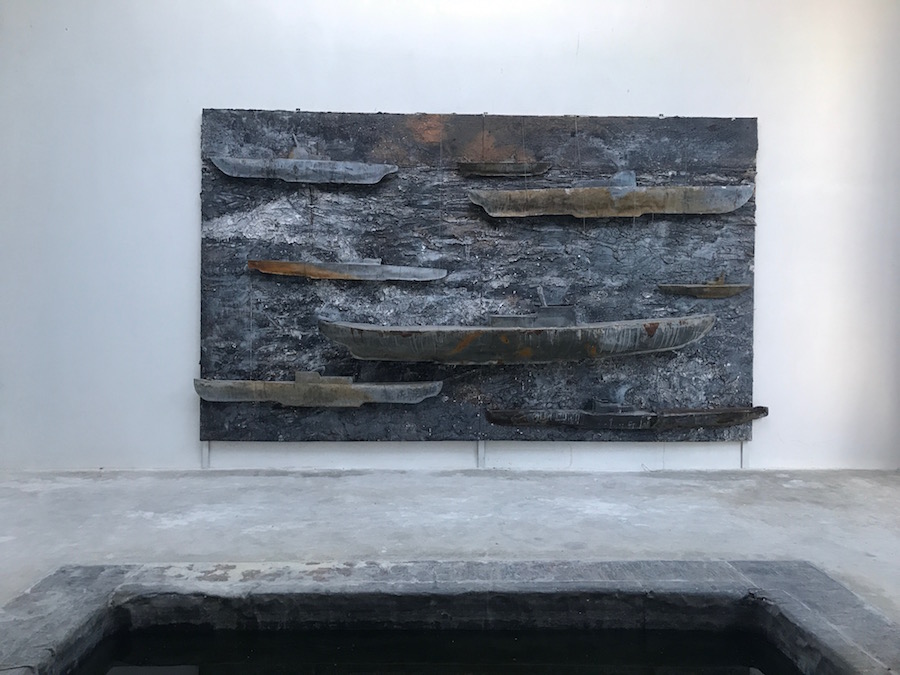
La Ribaute. Barjac. Anselm Kiefer. Photo: Elena Cué
What motivated you to include figurative objects such as submarines, sunflowers, tulips, etc, in your work? Why did you begin to combine painting and sculpture?
It is a question of reality. When I introduce an object, I do not create any additional illusion. What I make is what it is. Sometimes I want to be direct. Objects have their own spirituality.
Why did you choose painting instead of writing?
I cannot say that it was a conscious decision. It came to me this way. Throughout my career I have always had moments when I thought about writing a book. I have a lot of book concepts in my diary but I cannot say I have decided on one.
Then, is it a balance between writing and painting?
Yes, but it is not writing, it is rather experimenting with oneself. I do not write fiction or poetry. Poetry is something different; you arrange the words in a certain combination that has never been seen before.
What about painting?
It is recreation as well.
Do you reflect yourself better through painting than through writing?
Writing helps us analyze what we have done. Besides, it is a form of self-assessment.
Do you ask yourself if you are satisfied?
All the time.
How do you feel when you read your own work?
My writings are for me a way to remember. The new arises from memory.
And when you look at your paintings in retrospect?
Exactly like Paul Valery, sometimes I think they are marvelous, at other times they make me feel desperate.

La Ribaute. Barjac. Anselm Kiefer. Photo: Elena Cué
You have said that art is closest to the truth. Could you explain this concept?
Art is even closer to the truth. It is truth.
Do you think that through art you are able to express who you really are?
I am not important. I am sometimes me and then many others.
The Holocaust is very significant in your work. It is depicted through a wide range of symbolism. What is your objective with the representation of the darkest moment in your country’s history?
When I was growing up, the Holocaust did not exist. No one spoke about it in the 60s. I felt that there was something hidden. By accident, I got a disc with the voices of Hitler, Goebbels and Goering. It was made by Americans in order to educate Germans. I was so fascinated by Hitler that I began to study. I wanted to know what it was all about.
Was it necessity or curiosity that prompted you to investigate it further?
It was curiosity. When you begin to study what happened during those times it is so horrible that it is hard to imagine. Only in 1975 in Germany did they finally start showing exactly what had happened during the Holocaust. Ever since then the Germans have been quite good at revealing it. The French are still hiding a lot of it. At the time, Austrians wanted no relation with anything German. An Austrian journalist complained to me that I put Austrians and Germans in the same category. Back then Hitler was surprised as he thought he would have to fight Austria in order get an unification. It turned out they all wanted it already. They were even more efficient and accurate with their Jewish lists than the Germans. The French forcefully sent about 100,000 people to work in the German weapon industry. I never believed that there was a point zero. Democracy was first brought by the Americans.
During the keynote address of your lecture series at the Collège de France, you said that you learned most about art through reading The Thief's Journal by Jean Genet. Could you explain why?
I was so overwhelmed by his writing. He literally turned everything upside down. He would take the most honorable thing you could do and stick it deep in the swamp, whilst the most horrible thing, for example, to kill someone, he considered a piece of art. He turned everything upside down and this was fantastic to me.
You said: “The alchemy of transforming the abject into art is the true magic”. Why are you so attracted to alchemy?
Alchemy is the first step to science, chemistry and physics. It is the teaching of transmutation. It is also a spiritual movement. People always say that alchemists try to turn lead into gold but the real alchemists do not want to do that. It is a picture to transform yourself on another level. Alchemists are the first natural scientists.
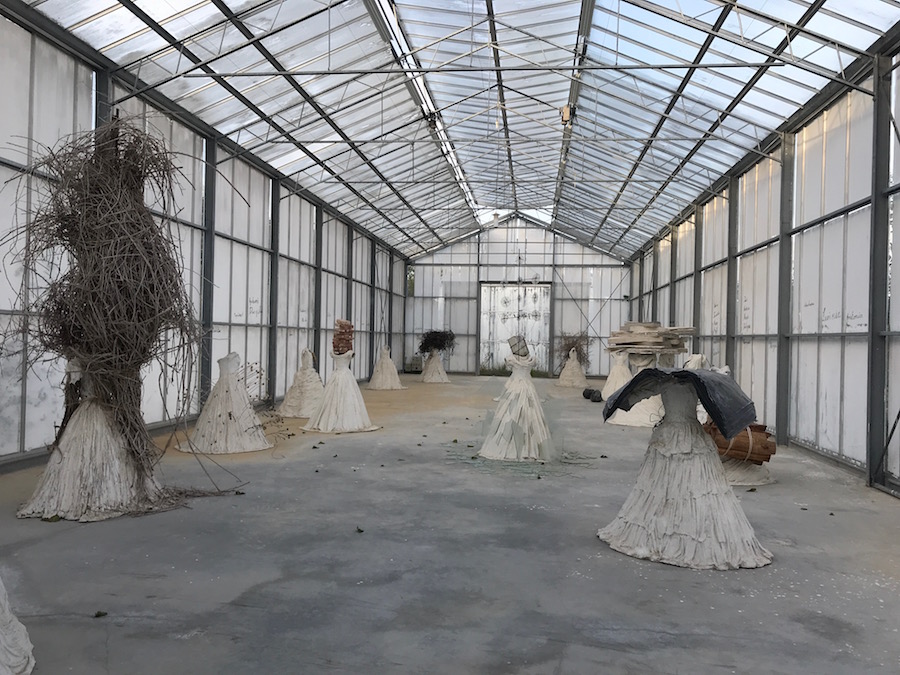
La Ribaute. Barjac. Anselm Kiefer. Photo: Elena Cué
You were photographed dressed as a woman for the work Jean Genet. You depicted women in Les Femmes de la Révolution, Les Reines de France, Les Femmes de L'Antiquitié, en Margarethe y Shulamith. What do women represent in your work?
I am always overwhelmed by women and I think they are more connected with the roots of earth. They are more powerful than men.
You say that art should be subversive and disturbing. What do you think about the relationship between art and society?
I am going to refer to Jean Genet again. He is subversive because he preaches that stealing and killing are the best things; that you have to become a traitor. Art can never be moralistic. Art cannot be a judgement of society because morals are connected to the times. Let us go back to the times of Greek democracy. In those days you could have slaves. Even Aristotle said that in order to be a good philosopher you have to be rich and have slaves. It is all connected with certain times. Artists should not be connected with a specific moral behavior.
You have spoken extensively about the artist being a destroyer and a creator. It is key in your work. Could you elaborate on this concept?
The artist is an iconoclast, he or she destroys all the time. There is art and anti-art. If the artist is not an iconoclast then he is not really an artist. You can see it through the history of art. I destroy what I do all the time. Then I put the destroyed parts in containers and wait for the resurrection.
The idea of infinity is implicit in your work and provokes a sense of the sublime. Do you intend to do so?
Eichendorff in his poem, sends his soul out in the world and then it comes back to him. It is a never-ending circle. I follow the philosophical system which includes emotion, will and reflection. Eichendorff describes a globe as a sphere; a kind of a sphere that gives immunity. Before you are born, you share a sphere with your mother, you are connected in the womb. This is the first sphere. Then the sphere gets wider as you meet more and more people. The romantic sphere is endless. It goes to the infinite and comes back.
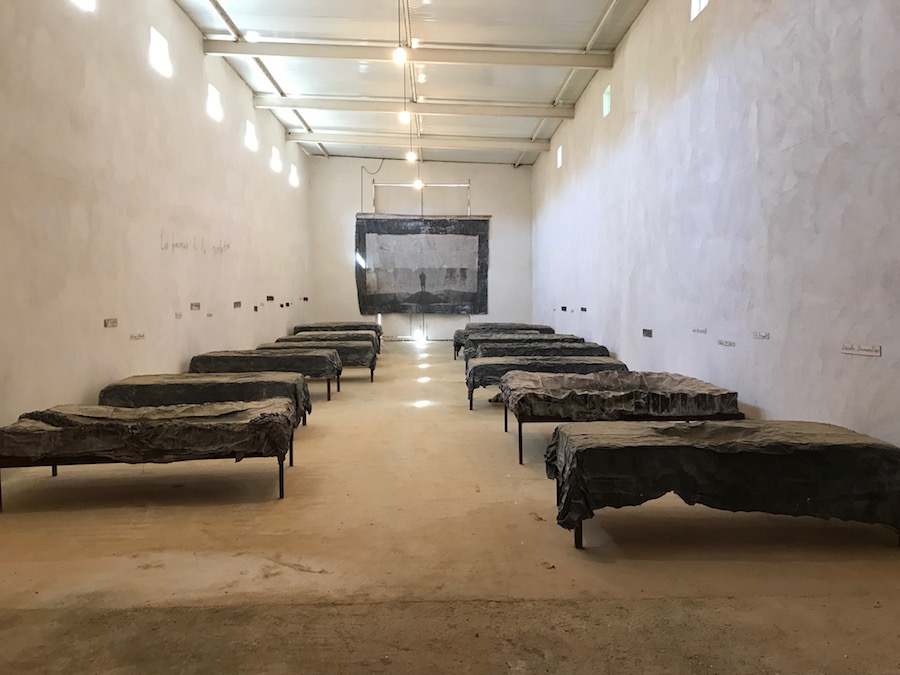
The Women Of The Revolution. Anselm Kiefer. Photo: Elena Cué
The landscape with your figure in the middle of the Les Femmes de la Révolution room reminds me of Friedrich's landscape and the concept of the sublime. Do you look for the sublime?
It is not really my world. Who invented the word sublime?
The first to use that term was a Greek from the Hellenistic era, but it became popular at the beginning of our time, and among others Kant who wrote a book about the beauty and the sublime.
There is a wonderful quote by Kant: “Two things fill the mind with ever new and increasing admiration and awe, the more often and steadily we reflect upon them: the starry heavens above me and the moral law within me.”
Are there things that have come to the surface through your work that you would have preferred to keep hidden?
No. There is so much that is hidden. You can reveal as much as you want and still never get to the center.
What is your opinion of the first Documenta and Nazi Degenerate art.
I looked through all the Nazi paintings and architecture and did not find a decent painting. I studied them all. I thought that there might be something hidden but they were all nonsense. However, architecture was different. It was not Nazi architecture per se, it was the architecture of the time because it was connected to tradition. You can see the same type of architecture in Paris and Rome. People wrongfully view that type of architecture as Nazi. For example, they say architecture should not overwhelm people. But why not? We are overwhelmed all the time, look at the stars, for instance. An architect must show this. I like Karl Marx Allee in Berlin.
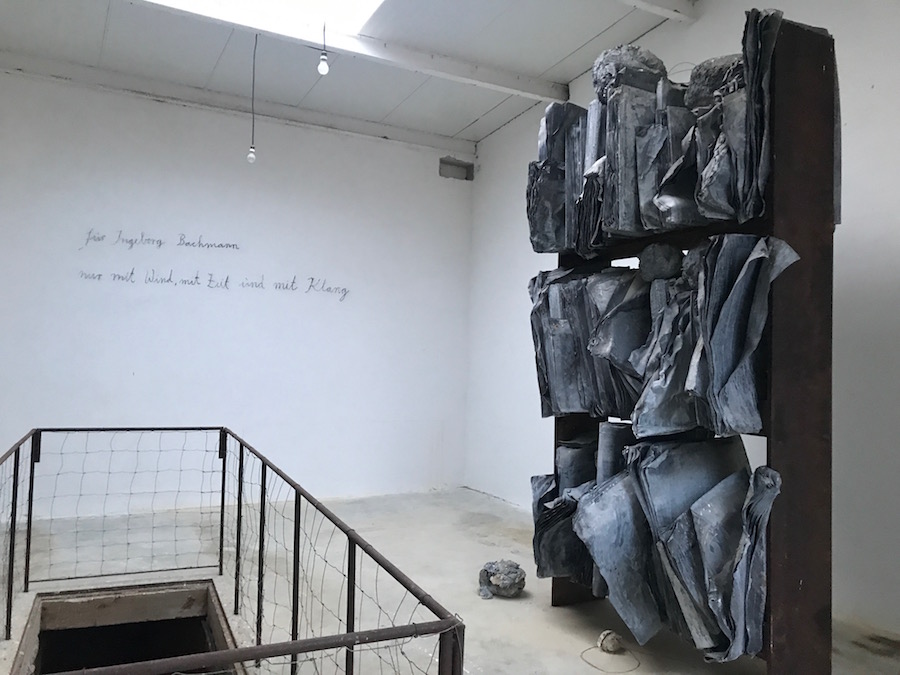
Library. Anselm Kiefer. Photo: Elena Cué
What is your relationship to books? What significance do books have in your life and work?
Books I have made represent sixty percent of my work. I still have most of my earlier books as they were never really for sale.
And in relation to painting?
A painting is different from a book because you can stand in front of it and see an impression of something. When reading a book, you turn the pages; it is connected to time. I like to write books because I can show the process. When I do a painting, I always have a war in my head. At each stage of the painting I have a hundred different possibilities to choose from. For instance, when Picasso was stuck during the creative process he used to tell his wife, Francoise Gilot, to copy his painting so he can come up with a different outcome. When you are painting you always have to make decisions. As you make a choice to go a certain way, you give up a hundred other possibilities.
Always Unfinished - Anselm Kiefer in L.A. - Courtesy of Rick Meghiddo
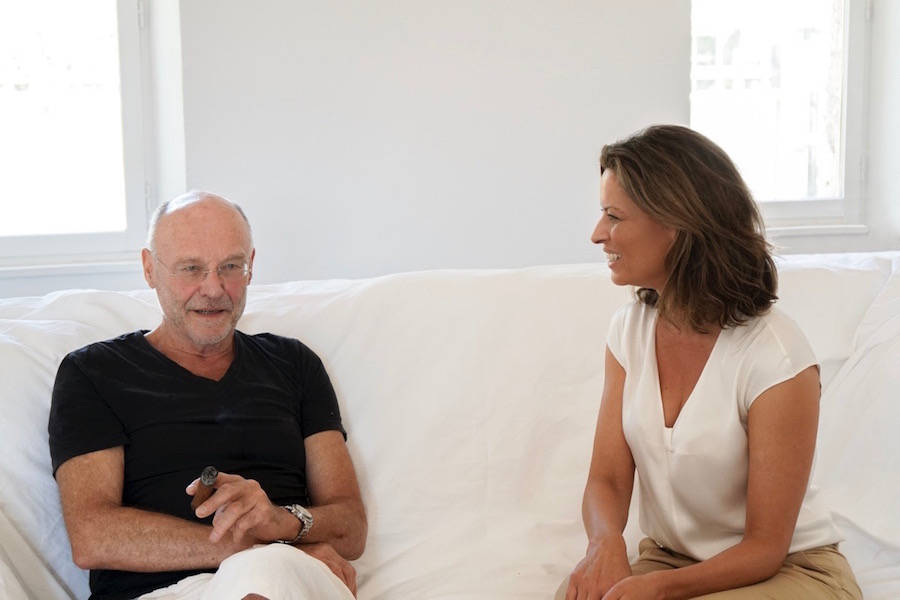
Anselm Kiefer with Elena Cué. Photo: Waltraud Forelli
(Introduction translated from the Spanish by Shauna Devlin)
- Details
- Written by Elena Cué
Jack Ma ( China, 1964), founder and chairman of Alibaba Group, one of the leading tech companies in the world with Google, Facebook, Amazon and Microsoft. He is in the process of implementing five new strategies that will drastically disrupt the ecommerce market today. His goal is to start a transition and start delegating the steering wheel of his company to focus on what is truly important to him: philanthropy. Through his Foundation, Jack has one great plan: to rethink and disrupt the current global education system so that it can face the challenges of the digital era.
Author: Elena Cué
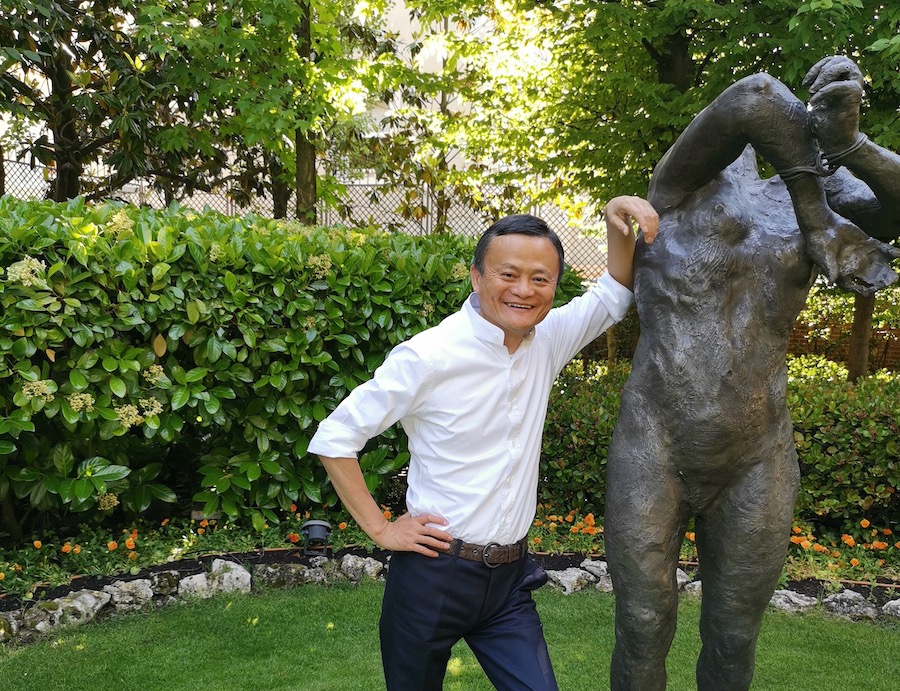
Jack Ma. Photo: Elena Cué
Jack Ma ( China, 1964), founder and chairman of Alibaba Group, one of the leading tech companies in the world with Google, Facebook, Amazon and Microsoft. He is in the process of implementing five new strategies that will drastically disrupt the ecommerce market today. His goal is to start a transition and start delegating the steering wheel of his company to focus on what is truly important to him: philanthropy. Through his Foundation, Jack has one great plan: to rethink and disrupt the current global education system so that it can face the challenges of the digital era.
The Jack Ma foundation you started in 2014 gives support to schools in rural areas in China. What are your future plans in that area?
There are close to 40 million students and young people living in poor rural areas in China. I think the best way to help kids is to help their teachers. Teachers in rural areas have very poor conditions. They are not respected and no one cares about them. We are trying to build a system to encourage, inspire and support them. Another way to help teachers is to train their headmasters. Most teachers give up on teaching because they do not like their headmasters. Headmasters in rural areas have never received even an hour of training, so how could they inspire teachers? That prompted us to start this program.
Unfortunately, a lot of schools in poor areas do not have enough kids. Each school has about 15 students in each grade. We try to combine them and create boarding schools with over 100 students. Teachers love to go and teach there. China, Africa and a lot of developing countries are experiencing the same problem. We are developing a huge plan. We want to improve the model we have in China and then use it in other countries. The other thing is how we can use internet and technology to train students, teachers and headmasters. I am really interested in this type of education.
Another remarcable program of your foundation is the African Netpreneur Prize that awards one million dollars and is currently open to all African technological entrepeneurs. What are your goals with that initiative?
Africa needs three e’s: eGovernment, eEducation and eEntrepreneurs. An eGovernment will be efficient and transparent. eEducation would be the foundation. Then, If they have great entrepreneurs, they will improve Africa’s economy significantly. What we do is encourage entrepreneurs and turn them into the new heroes of Africa. We inspire them to hire more people, to be more creative, to improve the economy. Just like what China has done for the past 20-30 years. I have been working on entrepreneurships in China for more than 20 years. I have personally built six companies that are all very successful today. I figured out ways to train and develop people to be entrepreneurs. I want to encourage that in Africa. My foundation gives one million dollars to ten African entrepreneurs every year. The purpose is to create successful case studies for entrepreneurs in Africa. Regardless of the country, area, age and type of business. It is not all about technology. If you run a successful barber shop or a restaurant, you can still receive an award. We want to show Africa that there are a lot of entrepreneurs and there are many ways to upgrade them.
Considering the current exponential development of technology, transhumanism and artificial intelligence, what do you think should education be focused on in this new world that is coming?
My view is that the whole education system needs to be upgraded. Today’s education system was designed several centuries ago during the industrial period. It trains people to remember and calculate things; it makes people smarter and more hardworking. Unfortunately, we are moving from an industrial period to a digital one. Over the past 30 years we have been trying to make people like machines. In the next 30 years we will be making machines like people. The current education system trains people to compete with machines.
Is not that an impossible battle?
Yes, there is no doubt in the digital age in which we live. The only way to succeed is to start teaching our kids to be more creative, constructive, innovative. This is the way the education system should follow. We have to train our kids not to have to best scores but to be the best version of themselves because no matter how hard you work on remembering and calculating things, a machine will always be able to do it much better than you will. If we do not change the way we teach, our kids will be in big trouble in the future. In the age of information explosion, we should teach our kids to have independent thought.
Now, the human beings worry a lot about artificial intelligence and robots...
But I do not. Robots are machines, they do not have a heart. They only have a chip. A chip can never dream like a heart does. The heart has love, dreams and creativity. If human beings only use their brains, no matter how hard we work, we will not be able to compete against the machines. Heart is about EQ and brain is about IQ. If we only compete with our IQ, we will be gone. We have to compete with our EQ and LQ plus our IQ. That is the educational system that the world needs.
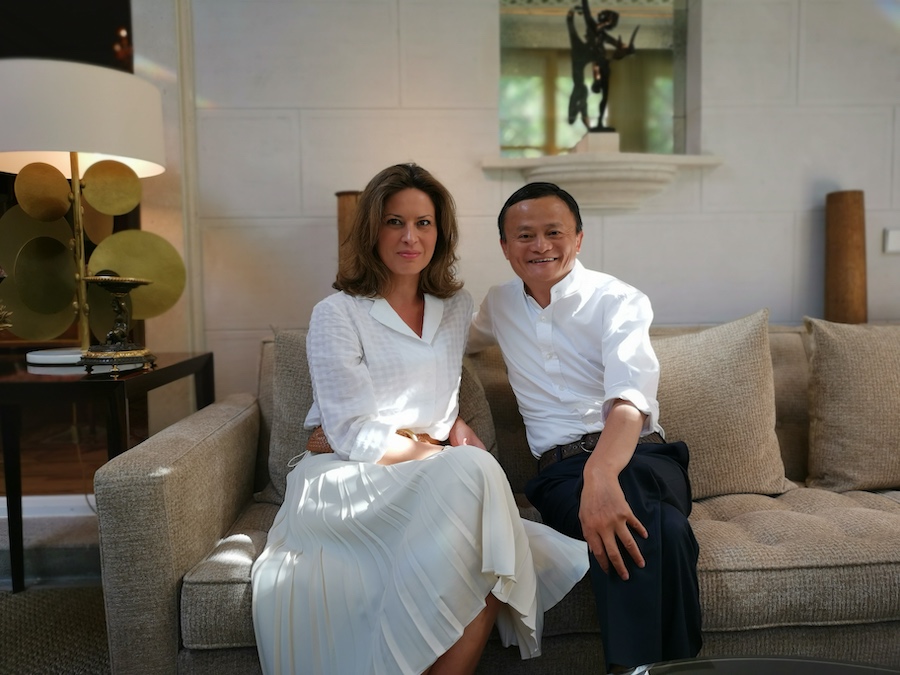
Jack Ma and Elena Cué
What does creating the E-commerce world giant Alibaba Group mean to you?
What we want to do is not to just make E-commerce. Alibaba facilitates all aspects of business. During the industrial era, only big companies were successful. They had the money, resources, network and technology. However, 99% of the businesses worldwide are small businesses. So we want to help small businesses compete and be prosperous. Today, Alibaba does everything to empower small businesses and young people to grow. Our dream is through technology to enable that every small dream comes true. That is why we focus on marketplaces. We build logistics, financial and cloud computing systems. These are the systems that can improve any small business and make it competitive. In the beginning nobody believed my vision but in the past 20 years all companies that have used our marketplace and systems have gone on to be successful.
How are Alibaba and Aliexpress different from Amazon?
We are not an E-commerce company. Amazon is an E-commerce company. We are helping companies become E-commerce companies, to become Amazon. People think we are the Amazon of China but it is not the case. We believe that any company can follow the Amazon model. We help them deliver, pay and receive money, reach the market and have the same technology capabilities as Amazon. That is our vision and what we think the world will look like in the next 10 to 20 years. And for that reason we have been able to create companies like Ali Cloud, one of the leading cloud companies in the world, Ant Financial, one of the world's main financial companies or Alibaba City Brain, a mayor global solution for control and monitoring of all the systems of large cities through an Artificial Intelligence brain.
Amazon buys and sells...
We do not, we provide solutions to companies. If you have an IT problem, we offer you cloud computing. If you have a delivery problem, we provide the logistics. If you are having issues reaching the market, you can use our resources.
What changes of your "Five Big New" strategies do you consider will be the most important in the future?
In the next 10 to 20 years we will be moving into the new retail. It is redefining the way retail works. Offline shops are waiting for customers to come. New retail is offline and online combined. It is no longer you going to the shop, now the shop goes to you. New retail has new manufacturing as well. In the old days, manufacturing was about ideas and engineering, making a product and selling it in the market. Because of data, in the future we will know exactly what everybody wants so we will be able to tailor-make it. In the past it was B2C (business to consumer), now it is C2B (consumer to business). The financial system of the past was the big banks looking for a customer who would like to invest. In the future, we will empower every small business that needs money. As long as they have a good credit rating system, they will get finances. We are redefining the financial system.
Cloud computing and internet technology is going to replace traditional technology. In the last century the competitive advantage was oil, this century it is data. Without data, it is difficult to customize and be innovative. Data is very important. These are the five elements that we think are going to change the world significantly. At first, the retail and manufacturing industries will not like it. Successful people love yesterday. But successful people only represent 20% of the population. What we want to do is make 80% of people more successful while making sure everyone is competing for the future, not for yesterday.
How can Artificial Intelligence help humanity?
Every technological revolution brings a disaster. The initial intention is always good but the consequences are not. As I said in Paris and New York, the First Technological Revolution, directly or indirectly, caused World War I. The Second Technological Revolution again, directly or indirectly, caused World War II. Now we are in the Third Technological Revolution. If human beings do not respect it, embrace it and lead it into the right direction, we may have some big problems. If there ever is a World War III, it should be a war against poverty, disease and environmental issues. Humans should use technology to solve their problems instead of using it to become more powerful and compete against each other. That is crazy and stupid.
What is the greatest contribution of the current Technological Revolution?
The first technological revolution relieved human energy. The second relieved distance. The current one relieves the brain. It will bring challenges but it will make human life better. I am 100% sure about that. The only issue is how we are going to train and develop our current and future generations to be ready for it. If you are not ready for that technology, you will be scared. And with fear comes problem. It is not the young people or poor people who are worried about the technological revolution, it is the powerful rich people and developed countries. That is very interesting. Artificial intelligence is coming. You can not stop the new technology but you can change yourself and embrace it. Technology should be used for good deeds. Tech companies have to take responsibility. Especially companies like us, Google and Amazon. We have a big responsibility to care for issues like jobs, privacy, etc. Only then will we grow together.
The Alibaba Group continues to grow dramatically. What do you think has been the key to its success?
First, you have to have a vision. Many companies tend to lose their vision as they grow. They always think about the current or next quarter. When you lose your dreams, you become a machine and human beings are not machines. In order to keep our company growing, we always think about the future. Compared to yesterday, we are big but compared to tomorrow, we are still a baby. The second key is people. You have to find the people that believe in the future. People who are innovative and are willing to work day and night. The third key is to respect your competitors. A competitor is not an enemy. If you think of your competitor as an enemy, it will be terrible for you. You have to learn from your mistakes and change yourself. I think I am lucky because I was trained to be a teacher. As a teacher you look at every student differently. You respect and love them for who they are. I have spent most of the past 20 years training and developing people. I think of them as generals fighting on the battlefield. We must believe in the future. It is important to know how to build a team as well. It is not about hiring the best people, it is about finding the right people who have the same vision and values as you. And then it takes time.
You said that the fact that 47% of your employees are women has contributed to your company’s success. In which ways do you think they did?
We no longer have 47% as we have just acquired two big companies with mostly male employees so that percentage lowered down a bit. I am giving my plea to the team so we can get back to those figures. If we have it below 33%, then we have a problem. I did not know we had so many female colleagues in the company until an American journalist asked me about it. I did not realize it at the time. Then I looked it up and realized it was true. More than 34% of our senior managers are women. That is a lot of women leaders. AliBaba became so popular on the internet. 15 years ago I told the team that the computer is all about code. However, it is not the computer talking to another computer, it is the people behind the computers communicating with each other. The computer is only a tool. We thought about making our services, software and products more human-like, more considerate. We found out that women do a better job on that. Women care about others much more than men. Unfortunately, men care more about themselves. Women care about their husbands, children, parents. They are more considerate. You need more people that care about others in your company. Women are more loyal as well. It is very difficult for other companies to steal them as employees. If you treat them fairly, they will be very loyal. We have so many great women leaders and employees at our company. Men think about what they can get. Women think about what makes them happy. In this century there will surely be more women leaders, not only in business, but in the world itself. The world will be more balanced.
You know women very well.
We have 700 million active buyers on our website every month. More than 70% of them are women. Women not only buy for themselves but for others. They are big shoppers but not necessarily always shopping for themselves. Look at what men are buying; they either buy things for themselves or a gift to impress a woman. That is human nature.
You have included the practice of Tai Chi Chuan, which you consider essential for your life, as part of your employees’ working day. Why is it so important to you?
Tai Chi is a philosophy about balance. It is about hard and soft, fast and slow. This is the philosophy I like. No matter how strong you look, you should be very soft on the inside. If you want to live longer, you should not do much exercise. Turtles do not move but live very long. However, if you want to live a healthier life, you should exercise more. That is how health and longevity compare. Turtles have a lot of diseases but they manage to live longer because they save energy. A lot of animals who run fast, do not live long. That is the balance. When you create products for your customers, you should also have this philosophy in mind. A lot of young people love to move fast. If slow is done properly, it ends up being fast. This is the philosophy I want to bring to the company. In the western society young people like boxing. Boxing is fast but how many years can you do boxing? By 50 you are gone. With Tai Chi, when you are young it does not make any sense. But when you reach 50-60, you get a much more balanced body. I want to make companies live longer with a philosophy behind them. If you only live for the next quarter, forget it. If you want to live 100, 200 years, you need to think about the culture that will make you live longer.
The most important thing about a company are the employees ...
In our company we believe everyone should treat work happily but treat life seriously. I always say “Do not work too hard. Please work happily.” I hate when people work very hard. How can they last? Only when you are happy, you get creative and innovative and you last long. When you find the click of happiness, a fountain of ideas comes out.
You are a board member of The Nature Conservancy and you also built the Paradise Foundation in China. What is your involvement in the preservation of the environment?
I have been heavily involved in environmental issues for the past 10 years. I worry about the air, the water. I spoke a lot on the subject and pushed governments to do something about it. Now, the Chinese government is finally starting to worry about the environment so I’ve started to pay attention to the things that people do not see, i.e. education. When everybody starts to pay attention to the environment, then you should turn your attention to other issues. There are no accidents on a very crowded road as everyone is more careful. It is the street with no traffic where accidents happen. We are learning from the US and Europe and their experience with protecting the environment. What I want to do is wake up the consciousness in society. The protection of the environment is a huge problem. If we do not take measures, there are going to be problems for all of us. It is so contagious and needs to be controlled.
What do you think is the secret to be able to fulfill our wishes?
The secret is your will. You should seriously believe this will and not because other people believe in it or society thinks it is right. You have to believe it with your heart. Then you have to find the people who believe it and you have to take action. And you need time. It is not something that happens overnight. You have a wish you truly believe. You find a group of people that truly believes in your wish. You have to be ready to take action and make mistakes every day. And then time keeps on moving, things will change. It is not a one day change. A lot of smart people with values and vision fail because of the time aspect.
What do you think about our country Spain?
I love it. The first time I was here, it was a cloudy day but the second time and this trip it has been great. The weather, the people, the culture, the food. I think Spanish food is much better than French food. It is more natural and healthier. Your culture has a bit of adventurism, romanticism, dignity. It is amazing. Spain needs to be known by more people around the world. I consider myself lucky to have been here three times. I would love to come here more often. Since my first visit to Spain, I have always tried to come more often. When they ask me which is my favorite country abroad, I always answer Spain.
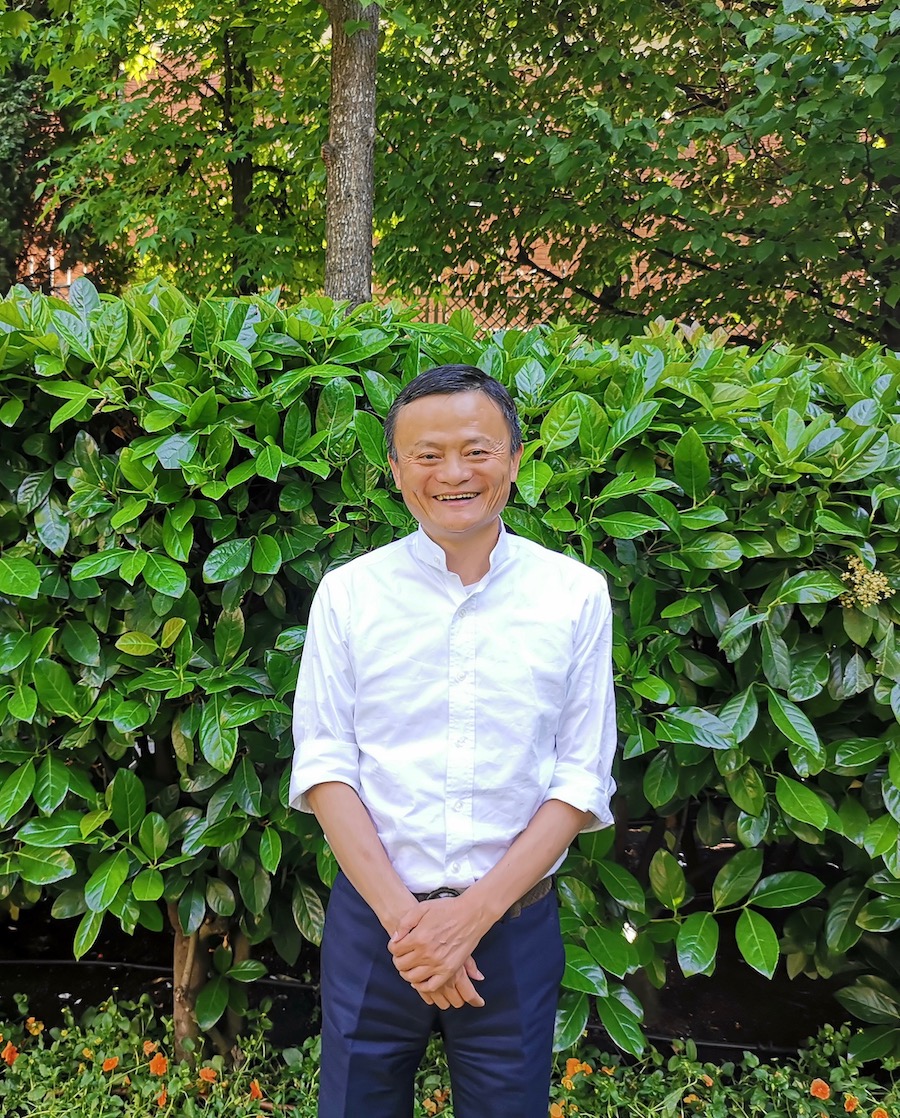
Jack Ma. Photo: Elena Cué
China has become one of the greatest world powers. What factors do you think have been key in the remarkable development of China?
In the past 40 years, what China has done is to start learning. Learning is so important. China used to be so closed. When a country or a person is closed, he/she refuses to learn from the others. What does close-minded mean? It means you refuse to learn new things. China opened its mind. We have learned from the US, Japan, Europe. Our people are so hardworking because we have been poor for so many years. For example, today in China, in a city like Beijing or Shanghai, if you take 100 young people, 90 of them can speak at least 20 English words. But if you go to New York or Washington and take 100 American young people, how many of them can speak a foreign language? Why? Because we have learned. Learning and hard work can change everything. The other factor is that China really respects knowledge. It is improving a lot. In the early days, we took on a lot of the outsourced low-end work from the US related to road work and clothes manufacturing. We did not care, we just wanted to do it. Everyone can be successful if he/she works hard. You do not care if it is big or small, you just do it. There are a lot of reasons behind China becoming the second largest economy. This is something that the world should see and respect. We are hard-working, we learn, we are open-minded. Of course, there are still a lot of things that China needs to improve.
For example?.
China only just connected to the world in the past 40 years. USA, Europe and Japan have been connected for the past 100 years while we have just opened up. We do not have an international language in order to communicate. There are a lot of problems. It is the duty of people like me. I travel around the world in order to learn to communicate. I go back to China and tell people and businesses there. Today a lot of problems arise because a chicken is talking to a duck (Cantonese proverb: miscommunication due to a language barrier) They are very angry so they do not talk. There should be a language that they can use to communicate. People do not respect you because you have money but because you take responsibility. China has been learning to survive, to develop economically and to take responsibility. That is the big lesson that us Chinese are learning.
Thanks to Alibaba's and Ant Financial, China is today the most advanced financial service industry in the world. Among your achievements are having being able to have 100% security on all transactions, both on the front and back end. People do not need a wallet or a credit cards any longer, this has greatly increased the financial inclusion of the population and now you are able to pay using your face thanks to facial recognition. Could you tell me more about the "3-1-0" method of Ant Financial?
This is a very good question. I started studying interfinancial issues 15 years ago. It was very interesting. At that time at Alibaba, I found an interesting opportunity online. A person wants to sell. He finds you but you do not know how you can buy from him. He offers you his product and demands your money. But if you give him the money and do not receive the product, you will be cheated. At the same time the seller is worried about getting the money himself/herself. I found that this kind of issue lasted for long and there was no solution. So I went to the bank and asked for help in order to solve this problem. The bank did not trust this model and thought our business is too small. I was frustrated so I decided to build our own financial system to be the export of service. I act as a middleman between buyer and seller. The buyer deposits his money to me. If he/she likes the product, I release the money. If he/she does not like the product, I give him his/her money back and return the product to the seller. That was a very simple model. Everybody at the time was telling me how stupid it was. I did not care if it was stupid as long as it worked. The government did not give us a license as there was no such model to use as a reference. I went to Davos World Economic Forum and heard Clinton speaking about leadership being about responsibility. It inspired me to take action. As it was such a simple and easy model, it became really popular. Everyone started to use it. There is even a bank that is using it now. The funny thing is that banks hate it. Normal banks need 500 people while we only need 15. Regular banks charge transaction fees of around 50 dollars while we can do that with 3 cents. In order to survive, you have to think about how to be quick, efficient and cost-effective so you can compete with the banks. The ‘310 model’ is open to everyone in China today. If any company wants to borrow money from us, they can apply through a mobile or a PC. Within three minutes of filling the forms our machine tells you if you are approved or not. The money will then be in your account within one second. It is all credit score based. No one actually touches the money. That means that people do not have to drink wine with bankers in order to get a loan. There is no bribery. We do not want our employees to talk to any of our customers because the data will tell us whether they are good or not. The banks were so scared for the past 10 years. You can borrow one cent from us. You can even borrow one minute. It is a disaster for banks. How can a bank give you a loan for just one minute? How can you borrow just one dollar? We can do that. It is so powerful. The more people do it, the more we know their credit score and the more efficient we get. Society started to trust in the credit system so it pushed people to behave right. Today, if you have an Alipay account, you can go to a hotel or rent a house and you do not have to deposit anything. Even mothers now ask to check their future son-in-law’s credit rating before a marriage takes place. We call it ‘Sesame Credit rating’. We gave loans to twelve million different businesses last year. The default rate is only 1.4% or 1.5%.
Very impressive. You are a generator of good ideas.
We enjoy our work. We really care about our customers. Our values are in the following order: number one are our customers, second, our employees and third, our shareholders. I went to the New York Stock Exchange where the number one value is the shareholders. One of the analysts told me that if he had known shareholders are number three on our values list, he would have never bought shares of my company. I told him he can sell our stock right away because this is our philosophy. We know that if we take care of our customers, they will take care of our employees. If we take care of our employees, customers will be happy and subsequently shareholders will be happy as well. Everyone knows that but no one is ready to say it out loud. Well, I am. When a problem arises, I care about our customers first.
According to your experience, what is the current state of the commercial relationship between the United States and China?
USA and China have some problems and this is very natural. We have had 40 great years of business partnership. We should find positive ways to solve these problems and we need to consider both sides. Competition and cooperation should be considered together instead of turning a competitor into an enemy. We should not solve a problem by causing another one. We have to always look positively. The bottom line is there needs to be a working relationship in place. When USA and Russia have a good relationship, it means world peace. When USA and China have a good relationship, it means prosperity.
I am grateful to Pelayo Cortina, thanks to whom it was possible to carry out this interview.
- Details
- Written by Elena Cué
One of the great thinkers and intellectuals of our time, Bernard-Henri Lévy (Algeria, 1948) has successfully launched a theatrical tour around Europe with his work Looking for Europe. It premieres in Spain next Wednesday, at the Teatro Olympia in Valencia, then goes to Barcelona and Madrid. In his monologue he defends democratic and liberal values from the threat of populism. He has also just published his book The Empire and the Five Kings, (Henry Holt & Company Inc) that explores the loss of global leadership in the United States and how the five powers, the ancient Empires: Russia, China, Turkey, Iran, and Sunni radical Islamism are weakening the values that have distinguished our western civilisation.
Author: Elena Cué

Bernard Henri-Levy (Ali Mahdavi)
One of the great thinkers and intellectuals of our time, Bernard-Henri Lévy (Algeria, 1948) has successfully launched a theatrical tour around Europe with his work Looking for Europe. It premieres in Spain next Wednesday, at the Teatro Olympia in Valencia, then goes to Barcelona and Madrid. In his monologue he defends democratic and liberal values from the threat of populism. He has also just published his book The Empire and the Five Kings, (Henry Holt & Company Inc) that explores the loss of global leadership in the United States and how the five powers, the ancient Empires: Russia, China, Turkey, Iran, and Sunni radical Islamism are weakening the values that have distinguished our western civilisation.
With this geopolitical analysis of the current global situation, what do you think will happen to Europe?
The first possibility would be for it to disappear from the world map and convert itself into a battlefield between Americans, who are losing their power, and the five new empires trying to defeat them. We may end up being a middle ground, where some will try to overthrow others. The solution would be for Europe to take advantage of this situation, to wake up and become a new superpower. But what is certain is that, in the new configuration of the world, the American umbrella no longer works. Donald Trump has said it very clearly, but Obama had already said it before.
Indeed, the debilitation began before Trump.
Yes, Trump is the epiphenomenon, not the main phenomenon. The main phenomenon is the fact that Europe and America are disconnected, and that happened before Trump.
In reference to the five powers, who you state want to end Europe, what would be their greatest benefit to come from this downturn?
For the forgotten and unfortunate populations, for example, the women of Saudi Arabia, democratic dissidents of China, or the youth of Iran, Europe is an example, a reference and above all, a symbol of hope. Europe is the light at the end of the tunnel. The main interest of these five powers would be to put out that light, to ensure their communities stop dreaming about Europe and that Europe cease to be a symbol of hope for them. As long as Europe exists and is strong, it poses a danger, not only from a geostrategic point of view, but above all from an ideological and spiritual stance. Because for all its people, Europe represents the image of a different future, as opposed to the harsh reality of what they currently are.
It seems that Russia would benefit most from Europe’s current weakness as it would further their geostrategic objectives.
China and Russia share their roles. China has the strength and Putin the intelligence. The money comes from China or the Arabic world, while reflection and strategy come from Putin.
Last year you created the play Last exit before Brexit performed in London. What do you think will happen in Europe without Great Britain?
What we are currently witnessing is that it is not so easy to leave Europe. The Brexit supporters defended their right to control their future, yet three years later, they have not obtained any positive result but they have lost control of the situation. The United Kingdom is out of control, although they are still in time to wake up from this nightmare.
Are you optimistic?
Rather realistic. Without Europe, the United Kingdom is going to collapse, and without the United Kingdom, Europe will suffer serious damage to its spirit and heart. Democratic liberalism and the merger of the political and economic is an English contribution; it was their great understanding of the best system for society, which the English devised in the XVIII and XIX centuries.
You also objected to the way Cameron used the referendum. Why is that?
Because you cannot respond with a "Yes" or "No" to such complex political issues. I'm not saying that people cannot have an opinion on such matters, on the contrary, it is exactly what democracy is about. However, it was a very broad issue which implied centuries of history, memory and ties between the United Kingdom and the rest of the world. The referendum should be seen as last resort after the other democratic possibilities for political decision-making have already been exhausted. The difficult thing about democracy is that it requires deliberation and commitment. When we are about to answer with a "Yes" or "No", you have to ask, are we in a plebiscitary or a Caesar-like regime? Or are we in a regime where democracy serves as an alibi for tyrants?
In Looking for Europe, you intend to influence the next European elections by drawing attention to the threat posed by populism. How do you think Europe can fight populism?
Populism is a threat to ideas, intelligence and beauty. It is also a threat to the complexity of things and to coexistence. Democrats and Liberals have to wake up and start fighting. They are too timid. I call for an awakening, which is the meaning of this work. It is not just a cry for attention. As liberal Europeans we do not want the simple solutions populism and the independence movement offer, and for that reason we have to wake up and speak up, bringing together the true power of speech and accept our opinions. If you are pro-Europe and pro-capitalism, you say it but in a very quiet voice. For example, the war against the elites is a disgrace and a suicide for Western democratic societies. We need to say all that before it is too late.
All of this is present in your work?
I speak of the "yellow vests" and of the outraged, of this whole movement which in my opinion, under the guise of democracy, is actually undemocratic. They are going to drag along our societies, just like at the fall of the Roman Empire or the end of classical Athens. I do not want that, which is why I have fought in places as far away as Afghanistan, Pakistan, or Kurdistan throughout my whole life. Now, I am convinced that the fire is in my house. And my house is France, Spain, Italy... That is why I have written this play, to return home and confront the war that has been declared by the populists.
Is the neoliberal ideology that caused the 2008 crisis not another equally dangerous threat against democratic and liberal values?
Yes, but it is a threat that can be controlled. Liberal capitalism has many flaws, but it has one virtue: it is constantly in the process of auto correction. It goes from crisis to crisis and it is the only economic regime in history to survive and overcome them. It is not the perfect correction, we know that there are bankers who have not understood the lessons of 2008, but capitalism is a machine that integrates the lessons of the past. It always has been. In this sense, yes, it is a threat, but a controlled one.
In 1976, you promoted the movement of the so-called new French philosophers, one of which was Alain Finkielkraut, who has just become the target of an anti-Semitic attack lead by a part of the yellow vests. The acts against Jews increased by 74% in France last year. Why do you think this is happening?
The real problem is not only that one group has insulted Finkielkraut, but that all those surrounding groups, such as the "yellow vests" in Paris and other cities, have not stood up in protest and said: "Not in our name!" Journalists in France say it is a small group. But why has the big group not condemned this aggression?
It is worrying.
We are experiencing the third great period of anti-Semitism in France and Europe. The first one was at the end of the XIX century, the second one during the 1930s and the third one is today. We know how the first two periods ended: in the worst possible way, in the form of suicide for European societies. What we can expect from this third period is that at least we have learnt the lessons from the past.
"Anti-Zionism is one of the modern forms of anti-Semitism." Do you agree with these words by President Emmanuel Macron?
I do not think that is the point. You can be a Zionist or not, you can love Netanyahu or hate him. The point is that nowadays, if you want to create and see an anti-Semitic movement grow, the only way you could do it is to be an anti-Zionist at the same time. It is a matter of political mechanics.
Why?
Because what an anti-Semite needs is to convince people that there are good reasons to hate Jews. What are they going to say today? That the Jews have a different chromosome? That they have killed Christ? No, of course, that does not work anymore. The only way anti-Semitism could work today is to say that Jews are friends of a State that is very bad and possibly fascist in dealing with another group, the Palestinians. If you manage to develop this notion, then you can create a real anti-Semitic movement in Europe. In terms of mechanics, ideology and politics, that is the only way. I am Jewish, but not Zionist. If I were a Zionist I would live in Israel and believe that this is the fate of the Jews.
What is the solution for Palestine?
Two states, one next to the other.
In your book, you also speak about the betrayal of the Kurds. They are courageously carrying out their duty fighting against the Islamic State. The Kurdish people are very grateful to you for your support with this book and your documentaries. As an opponent of nationalism, why do you defend the Kurds' pursuit to form their own nation in this case?
The difference is that they are being massacred by Erdogan, by the Iranians, and by Bashar al-Ásad. If the Barcelona separatists were faced with a dictator who killed them, I would be in favour of their independence. But they have a democracy, which is the exact opposite. For more than a century the Kurds have been annihilated by the powers that control them. In this case, independence is the only way out of death. Therefore, I am not in favour of their independence for nationalist reasons. I have never been a nationalist. I am interested in human rights and the rights of the body, meaning the right that the body is not martyred, tortured or end up assassinated.
It also shows that the Kurds profess a more moderate Islamism.
That is the second reason. It is something I mention a lot in the theatre performance. In Europe, we are desperately looking for the ideal Islam, one that is compatible with democracy, human rights, secularism, etc. An Islam that has the ability to overcome Islamic Jihadism and the terror we have of it. We had it in Bosnia and we have it in Kurdistan and in both cases we can observe the tragic paradox of Europe. This is one of the main themes of my play: when we have them, we let them fall. This is a spiritual, metaphysical, political and moral error.
The Muslim population in the West is increasing, particularly in France. You wrote the book Public Enemies with Houellebecq. Do you think it would be possible to have an Islamist government in France, as you write in your book Submission?
No, because Europe's liberal civilisation is much stronger than Houellebecq realises. It has the capability to integrate elements from other parts of the world, including Islam, but not to be devoured by Islam, that is not going to happen. I believe that the European civilisation is very strong; the only empire to survive all its crisis’ is the European Empire. "Empire", not to be understood in the sense of imperialism, but looking at Europe as a civilisation which, beginning with the Roman Republic, has continuously survived its looming death in order to revive. It is a unique case as with the other empires, when they die, they die. Europe may seem to die, but it comes back. In my work, I say that Europe, the West, is the only empire where its grave is always a cradle.
In your book The Genius of Judaism, you state that in Judaism the focus is not necessarily on believing in God, but more importantly on the study and understanding of God. Continuous questioning and reinterpreting.
That is what the Jews are asked to do. It is not so much about believing, but is about studying. Understanding, working and introducing more complexity in the world, or at least interpreting the complexity that occurs in the world and avoiding simplification.
You have mentioned that your way of thinking would not be the same without Foucault and teachers like Althusser or Derrida. From this multiplicity, how would you pinpoint your philosophical thought?
My way of thinking has roots, but the product comes from me. At my quite advanced age, I really believe this. I am not anyone's son. I was a good son, first to my parents and then to my teachers. I believe that today I think at my own risk and from a perspective that is mine. Indeed, the roots come from French structuralism, Jewish thought and Albert Camus. Those are the three great pillars.
A big feminist demonstration has taken place recently. In your book Women and Men written with Françoise Giroud it seemed that your thought was closer to the feminine while Giroud's was closer to the masculine. What do you think?
The relationships between men and women, and in particular my relationships with women were, and still are, one of the great subjects of my life. Secondly, and it may not be very politically correct, I think that for a man women are a mysterious, unknown, foreign continent. Thirdly, I support all the claims of neo-feminism, because to say that it is a distant and mysterious continent does not imply that equality has already been achieved or that there are no wrongdoings. For example, I have always thought that if I were a woman, sexual harassment would drive me crazy. Today there is an awakening in society to say 'enough is enough '. Women have the power and the right to say 'yes ' or 'no' or 'maybe '. That is a revolution.
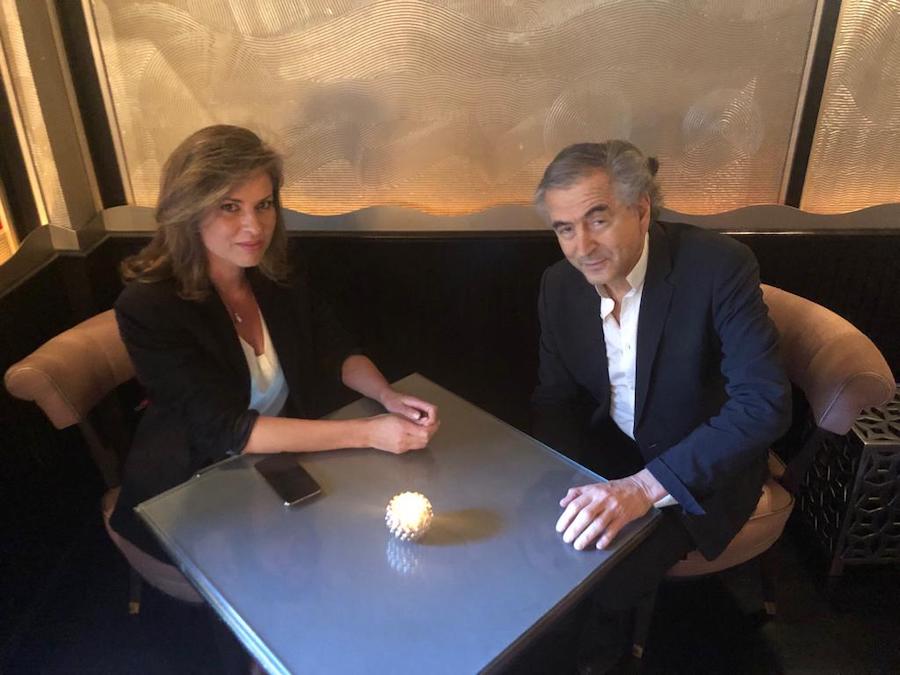
Bernard Henri-Levy during the interview.
- Interview with Bernard Henri-Levy - - Alejandra de Argos -
- Details
- Written by Elena Cué
On the occasion of the Madrid Book Fair, Mario Vargas Llosa talks about his latest publication, "The Call of the Tribe", an intellectual and political essay on the philosophers and authors who have shaped his thinking. Which book from current Spanish literature would you most highly recommend? Out of all I've read lately, perhaps the most interesting would be Javier Cercados' "The Impostor".
Autor: Elena Cué
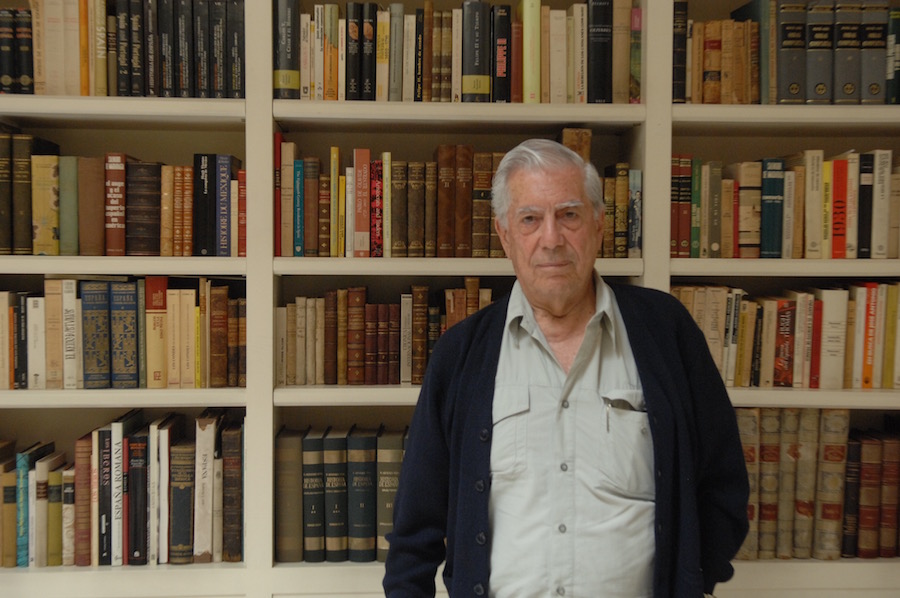
Mario Vargas Llosa. Photo by Elena Cué
On the occasion of the Madrid Book Fair, Mario Vargas Llosa talks about his latest publication, "The Call of the Tribe", an intellectual and political essay on the philosophers and authors who have shaped his thinking.
Which book from current Spanish literature would you most highly recommend?
Out of all I've read lately, perhaps the most interesting would be Javier Cercados' "The Impostor". It's a wonderful book in that it is both a report that reads like a novel, whilst at the same time having as protagonist a character one would find hard to believe was real. It's a very entertaining and fun read.
In your latest book, "The Call of the Tribe", you present a staunch defence of liberal doctrine. With regards to the media today, how does one reconcile freedom of expression with fake news?
I think that is one of the biggest problems of our time. We're seeing a real revolution in the field of communications but this, instead of spreading the truth about what is happening in the world, has allowed fiction to infiltrate the media making it now very difficult to know what is true and what is seemingly true, but false. These are the famous post-truths of our time.
Elon Musk said recently that he wants to create a service - something like a qualification agency - in order for readers to be able to ascertain the journalistic rigour of any writer or media outlet. How would you feel about that?
I wish there were a reliable, valid way to reference and rate the media in terms of their truthfulness or falsehoods. As human beings, we are totally confused as regards the media today. They're pulling the wool over our eyes with the greatest of ease. Nevertheless, what's even worse is that there are nation-states with technology whose sole purpose is the dissemination of lies masquerading as truths. And this conspires tremendously against the very existence of democratic societies. Democracy is based on truth prevailing over lies so, if the boundary between these two becomes increasingly obscured and vague, it is democratic society itself that is threatened by this exaltation of those infamous post-truths.
So we are being played.
Freedom would disappear and people - come voting time - would often be basing their choices on facts that are completely false, exaggerated, distorted or, quite simply, blatant lies.
In your book, you talk about how you were an enthusiastic proponent of Marxism in your youth, but that you ended up distancing yourself from that ideology after witnessing, during visits to Cuba and the Soviet Union, how those ideas actually pan out materially. Do you believe that Liberalism helps more than Marxism to improve the lot of society's lower echelons?
Absolutely. One only thas to look at countries whose politics have been most effective in combating or eradicating misery and poverty, those who have created the best living conditions for all of its citizens. There isn't a single Marxist country among them. The countries that have attained the highest standards of living are democratic ones that apply liberal-style policies, as is the case with the Nordics, for instance, or Switzerland, etc. In Asia, the most developed countries are already democracies or ones that have been leaving authoritarianism behind and increasingly approaching what are now liberal and democratic societies.
Marxist countries, on the other hand, have been disintegrating and disappearing one after another and not because of any external intervention but because of the absolute inability of their institutions to meet the most basic needs, desires and illusions of any society.
Why did the Soviet Union fall?
The Soviet Union fell not because it was attacked. It collapsed because of its own inability to create a modern, efficient society offering full employment and an acceptable standard of living.
Why did Communist China suddenly become a Capitalist country?
That also happened because of China's collective and state inability to create employment and acceptable living conditions for all of its citizens. I think this is the most conclusive and definitive proof that Socialism, of the Communist variety, doesn't work.
Adam Smith, Popper, Hayek, Ortega y Gasset, Raymond Aron, Isaiah Berlin and Revel are the seven liberal thinkers who feature in your book. Is there something they all have in common?
Their tolerant attitude, their admission that, rather than being invariably self-evident and obvious, the truth is often vague and obscure and that, therefore, many mistakes can be made. Also, that what must always be fought against in the field of politics is dogmatism or the authoritarian imposition of specific principles or particular methods. In this field, I believe Liberalism has always been a doctrine of absolute tolerance and this tolerance is its best defence against violence.
Does Hayek's Neoliberalism have anything to do with the modern, more radical version?
Hayek has been on the receiving end of much criticism for having, shall we say, such an unshakeable faith that the free market would solve practically every problem and he is attacked as an extremist for it. There is some truth to that. He would often exaggerate his beliefs and even held some that I found to be absolutely false, such as that there was more liberty in Chile under Pinochet than under Allende. I think that was an outrageous comment for which he was roundly and rightly criticised. To think that a dictatorship that kills people or enforces press censorship can be more free than a democratic society, albeit an extremist one like Allende's, seems patently wrong to me.
Where would Liberalism fit in?
There are tendencies at the moment that come very close to Liberalism. Social Democracy, for instance, often verges on it. But then there are aspects of Conservatism that also border on it. Actually, I quote the case of Thatcher and Reagan who were both conservative leaders but who nevertheless made unreservedly and deeply liberal economic reforms which brought numerous benefits to their respective countries. So I think Liberalism is made up of many different nuances, all of them with laws and reforms that are open to criticism, fostering the potential improvements and systematic refinements that Popper called permanent reformism. Ultimately, this is the doctrine that has allowed countries to achieve the best methods for economic and social development, as well as democratic tolerance.
Do you agree with Hayek that intellectuals are the enemies of liberty because they are so detached from industry and commerce?
Unfortunately, twentieth-century intellectuals have demonstrated an extraordinary level of political blindness. First and foremost for not seeing how reality was so far removed from the grand illusions of Marxist socialism and, lastly, because they have contributed more than anyone else to devaluing democratic principles and presenting democracy as the mask of exploitation and colonialism, etc, something that democracy has never been. That is precisely why the attempt at attaining paradise, as proposed by Marxism, led, ultimately, to the creation of sheer hell on earth. By contrast, democracy doesn't aspire to build a heaven on earth but rather it hopes to create a system with the potential for near-perfection via periodic reforms to improve progress towards combating major issues like unemployment and health with ever greater efficiency. And this is a reality that is borne out by facts because the most advanced, least imperfect societies are democratic or, in other words, liberal ones. It's true that democracy isn't perfect. There's been corruption at its heart, without a doubt, and that's the reality. But the most imperfect democracies are still preferable to the most perfect dictatorships, always.
In a world where wealth production has become the principal value, what do you think is the function of the intellectual today? Should intellectuals play an active part in society and politics?
I think participation is a basic democratic principle. If you don't take part in public debate then you have no right to complain, not even if you're only doing it in writing. There's nothing that destroys language as much as politics does because politics is about soundbites, set phrases, sayings that don't express truth or reality. In this area, intellectuals have a really important role to play. Also, on another level, I think a society without ideas is one that is condemned to die.
Where should these ideas come from?
Ideas come out of culture which is the great source, the supplier. So, in that sense, intellectuals should be like the seven thinkers in my book who have contributed, in such a decisive way, to the refinement of democratic doctrine and its institutions. Although, having said that, the ideal would be for intellectuals to differentiate between fact and fiction. There is a reality that can be perfect and that is the reality we create through painting, poetry, literature, etc. In that sphere, yes, perfection is achievable. Where it is not achievable is in the realm of politics or society. It's impossible for the whole of society to share the exact same values or to agree on what defines beauty or true pleasure or what the greatest achievements are. These things vary enormously depending on the idiosyncracies and personality of each individual. In this sphere, what's fundamental is that there should be great freedom for every individual to organise their life according to their own values and without compromising, damaging or erasing those of others.
In that respect, intellectuals shoulder great responsibility?
I believe so, yes. Take Sartre, for example. I was an avid reader and follower of his yet he ended up defending the Chinese Cultural Revolution which resulted in twenty million dead. On the other hand, the one thing I found compelling about Sartre was his stance on anti-colonialism. But then he went on to defend the Soviet Union and the Chinese Cultural Revolution which was one of the worst atrocities imaginable.
In your book, you don't just talk about Sartre ...
No, not only Sartre. How many other illustrious French intellectuals, like Roland Barthes, went to China? What was a sublime purist like him doing defending the killings and the horrific violence? The whole Tel Quel group went to China to pay homage to Mao and his Little Red Book. There's a contradiction there that's difficult for us to understand but I think it's that they were under the illusion that Communism would guarantee this perfect society and it would be like a great work of art, a masterpiece, a symphony. And, in the end, what did Communism do? It created hell on earth.
What do you think of the economic measures taken by Trump as regards bank deregulation, tax cuts and increased trade tariffs?
To a liberal, any decrease in taxation seems like a good move. But Trump's policies are completely contradictory because, on the one hand, they might well seem liberal but, on the other, they couldn't be further from liberalism, as in the case of border control and immigration. If you notice, this is very much at odds with the great American tradition of open borders. The USA is a nation of immigrants, a country whose grandeur arose from having opened its arms to the whole world and welcomed immigrants from practically every culture on earth and, thanks to what Americans call the "melting pot", integrating them into a society that really was the driving force for progress. I think Trump's policies go against that great, American, liberal tradition.
Moreover, it's really difficult to find either political - nationally and internationally - or economic coherence because of this constant contradiction. It's systematic confusion. For example, I think his anti-immigration policy is in direct conflict with every single liberal, democratic principal there is. Separating children from their parents is cruel, it's inhumane and it's in direct opposition to the spirit of democracy.
I would never have imagined that America, a seemingly advanced society, could choose a character like Trump, who is basically a populist. He's an unpredictable person.
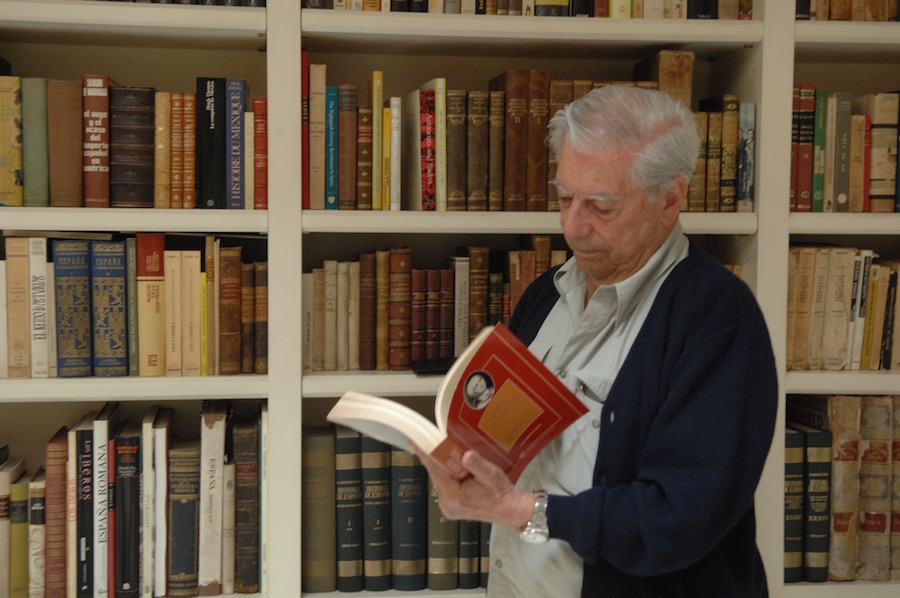
Mario Vargas Llosa. Photo by Elena Cué
Three of the seven thinkers who appear in your book are Jewish and of those, Isaiah Berlin is in favour of Zionism and Popper is against. With regards to the current Israeli-Palestinian conflict, what are your thoughts?
What seemed to be the best solution was the two-state one. That had UN endorsement and there was a practically universal consensus that such a partition of the territory between Palestine and Israel should take place. At least half of the Israeli population agreed and there was this extraordinary movement called "Peace Now".
However, I think the critical moment was when Israel agreed to return 95% of the occupied territories and to accept Jerusalem as the capital of both Israel and Palestine. That Arafat rejected the offer was, I think, a very serious error of judgement.
Why?
Because since then, Israeli society has come to the conclusion - as hammered home by Sharon - that it isn't possible to reach an agreement with the Palestinians. This has made Israeli society increasingly reactionary and conservative while the pacifist movement shrinks day by day. In this sense, the tradition initiated by Sharon has been further radicalised by Netanyahu.
It's a situation that benefits no-one.
Absolutely. This state of affairs suits neither Palestine nor, to an even lesser extent, Israel. Israel is a country living in permanent danger, with constant military mobilisation and surrounded by enemies. It's also a country that's become very hardened, very violent and very militarised so it's become really difficult to defend Israel today after so many massacres. Granted, the country is very strong but you can't live in conditions like that. You can't live by requiring young people to do three years of military service. What kind of life is that
Reciprocal intolerance increases on a daily basis because, of course, on the Palestinian side the most radicalised forces are the prevalent ones. There's no solution in sight but what is clear is that this situation cannot continue indefinitely.
How would you rate Macron's first year as President of the French Republic?
I have a lot of time for Macron. I think he has liberated France from the clutches of fascist, extreme right factions such as the Front National and he has given French democracy back the youthfulness, idealism and dynamism it had lost. And not just French but European unity as a whole because he ran a campaign that benefited not only France but the European Union, also, which has since undergone an extraordinary revitalisation thanks to him. What's more, he's managed to bring people, who were otherwise absolutely estranged and fed up, back to politics. That's added a breadth and generosity to his politics. In a way, Macron has been the salvation of France at the time of crisis it found itself in, without a doubt.
In your book, you talk about "spontaneous orders", meaning those not personally determined by an individual but the ones that emerge spontaneously over time like, for instance, language, private property, commerce, markets. What would you say were the spontaneous orders of today?
Hayek believed in something quite fantastical - that the institutions which really prevail are not the ones created from power but the ones we carry along with us from the past. In other words, the ones that have survived the passage of time and new experiences, the ones that have demonstrated their ability to transform themselves over time and with time and tradition. These "spontaneous orders" are the best guarantee of prosperity a society can have. I think Hayek was totally spot-on about this.
Could women's rights, such as they are now, be among them?
Without a shadow of a doubt. Right now, we're seeing how this movement has gained traction and I think it's going to be a compelling one that will ultimately prevail on all levels, everywhere. Why? Because it's a matter of essential justice. Women, for the mere fact of being women, have been conditioned throughout history to be discriminated against, to be marginalised, and the time has come in humankind's evolution for this to no longer be tolerated. And it's not just intolerable for women. It's intolerable for any person with even a modicum of culture and sensitivity. This recent mobilisation towards gender equality is a magnificent example of a spontaneous order.
We complain about dumbed-down culture yet, at this moment in time, museums are full, tourism is massive, millions of books are published every year ... Is that another spontaneous order of our day?
I'm not so optimistic as far as culture goes. Yes, it's become more widespread but it has also become more frivolous and trivialised. The ideal would be for it to spread, but without the frivolisation, because if there isn't a certain hierarchy, if values are confused, if there's no longer any excellence or mediocrity and ineptitude in the field of culture ... That's not to say that the elite should disappear, nepotism aside, but in the cultural field there are certain vocations that demand a certain discrimination. And this is what determines the standards of cultural excellence. That discrimination would be the effort, discipline and talent, basically, that mean certain people, certain individuals reach greater heights than others. We cannot stop acknowledging this, because if we go by the lowest common denominator then, ultimately, it's culture itself that will collapse.
(Translated from the Spanish by Shauna Devlin)
- Interview with Mario Vargas Llosa, Nobel Laureate - - Alejandra de Argos -
- Details
- Written by Elena Cué
Literary sources, poetry, music, folk stories, Salazar's repressive regime and the vulnerability of women in a hostile world are just some of the influences that shape the work of Paula Rego (Lisbon, 1935), one of the most important Portuguese artists of our time. Based in London since 1976, Rego has received numerous acknowledgments in the course of her career. Indeed, she has been made a Dame Commander of the Most Excellent Order of the British Empire. The presence of the English artist Victor Willing, her husband, in her life left an important mark on her art. Willing died in 1988 from multiple sclerosis. Her works, which give us an insight into the peculiarities of Portuguese society, are rendered universal stories by the touch of the artist's hand.
Author: Elena Cué
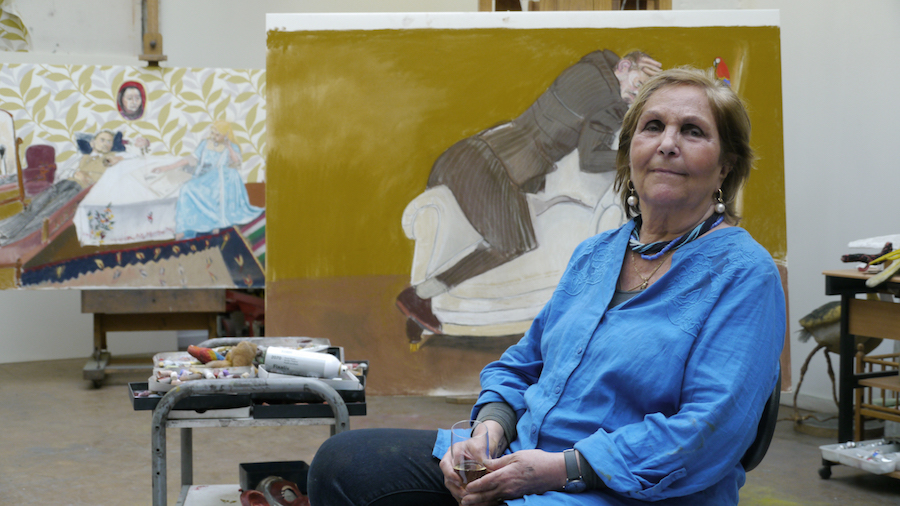
Literary sources, poetry, music, folk stories, Salazar's repressive regime and the vulnerability of women in a hostile world are just some of the influences that shape the work of Paula Rego (Lisbon, 1935), one of the most important Portuguese artists of our time. Based in London since 1976, Rego has received numerous acknowledgments in the course of her career. Indeed, she has been made a Dame Commander of the Most Excellent Order of the British Empire. The presence of the English artist Victor Willing, her husband, in her life left an important mark on her art.
Willing died in 1988 from multiple sclerosis. Her works, which give us an insight into the peculiarities of Portuguese society, are rendered universal stories by the touch of the artist's hand. Life experience and a fertile imagination operate as the driving forces behind the mysterious narratives of her paintings. The essence of her work reveals itself in the interpretative ability and search for meaning of the signs that are inherent to the same.
Could you begin by talking about your childhood memories that have subsequently been key in your work?
I remember being very small and frightened of everything and my mother had an old maid who would still visit and she’d be allowed to put me to bed and tell me stories and the stories would block my fear and help me go to sleep.
I had an aunt called tia Ludjera, she used to come and stay with us in Ericeira and after lunch we would sit on a bench by the eucalyptus trees and she’d say “what type of story would you like to hear?” and I’d say: “a story about a princess whose father was a king and she meets a prince”, you know, the standard answer and then she’d start: “Once upon a time, there was a lovely princess”, which was me of course, and then she’d continue. She’d continue from one day to the next, the same story and she could go on for weeks with exactly the same story, developing it, adding things, she was fantastic.
Did you use these stories later?
It was just the feeling of stories that I liked so much. I still like them now.
Did you use those stories or the feelings you obtained from them in your paintings?
I used the feelings they provoked. Specifically the feeling of comfort, it brushes away fear. There was an immersion into another world, a much better world than the one I was in even though I had a very good world. My grandfather was immensely kind and spoilt me with presents. Stories were very important, in fact, they still are.
Where does that feeling of fear come from? Fear of what?
I think from being left when I was very little. My parents left me with my grandparents when I was one and didn’t come back until I was two and a half and of course when they came back I didn’t even know who they were. Maybe it was that, or so they tell me.

The Family. 1988. Copyright Paula Rego, Courtesy Marlborough Fine Art.
How did growing up during the authoritarian rule of a dictator like António de Oliveira Salazar mark you?
During the war Portugal was neutral which meant all sorts of people travelled through Lisbon to get on boats to go to America but there were Germans too who raised their arms and said “heil Hitler”.
Salazar remained after the war. They said he wasn’t a dictator like Franco but he was just as bad. We had secret police who tortured people and killed them. Bribery and corruption were normal. Poverty was rife but he said it was a lovely country with happy rural families but it was not lovely at all. Women were beaten and there was censorship. You had to be careful what you said. The catalogue for my first show had to go to the PIDE, the secret police to be censored in order to check it was allowed, everything had to be checked. It was a terrible country.
In what way are these circumstances evident in your most socially committed works?
I used the circumstances in my pictures, for example ‘Salazar vomiting the motherland’. It was strange, when I was doing that picture I suddenly started to feel sorry for Salazar, which is not very good as he was a monster. Another picture was called: ‘When we had a house in the country we’d have lunch and then we’d go out and kill the black people’. That came after my husband overheard men at a Lisbon club boasting how they had cut off the heads of the Angolan fighters and played football with them. He was horrified.
From this it is evident Goya has been a fundamental reference for you. What emotional significance does his work have for you?
Not just for me, but for everybody he was so amazing. Goya drew all the terrible things that people do to each other and the black paintings are wonderful. The best place to see them is in the Prado, well it’s the only place to see them.
Did his paintings influence your work?
Well, he was present all the time in my mind. I was taken to the Prado when I was quite young you see.
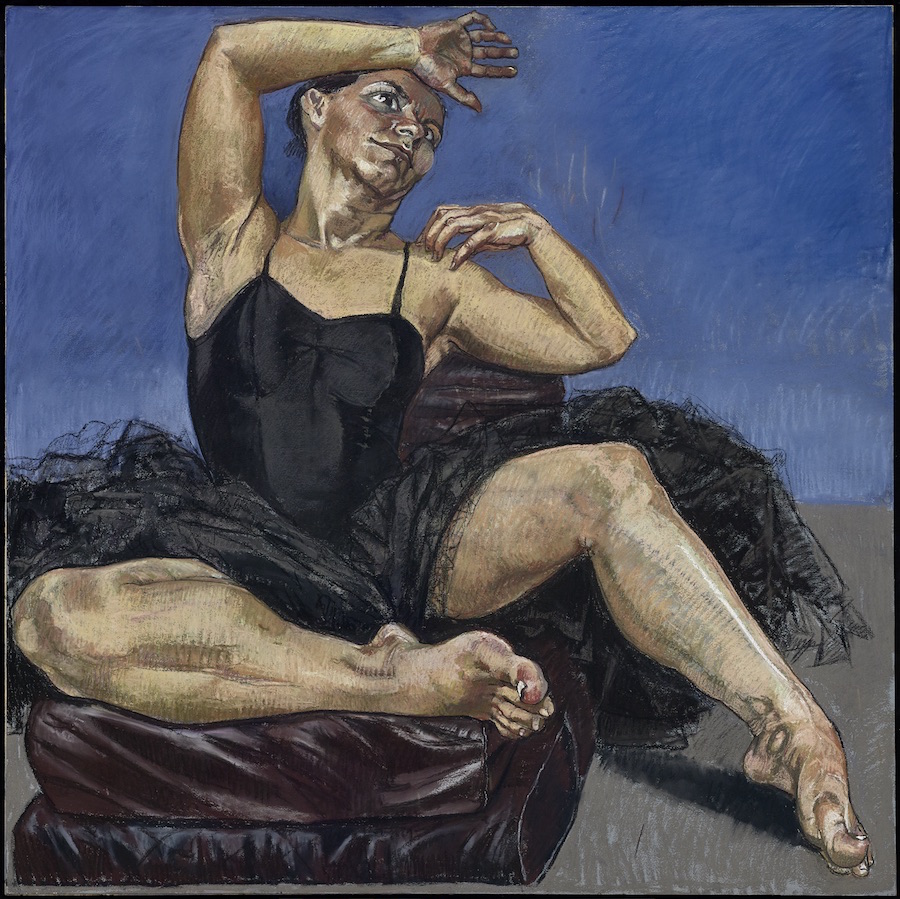
Dancing Ostriches. 1995. Pastel on paper on aluminium. Copyright Paula Rego, Courtesy Marlborough Fine Art.
During the period when you painted by observation, what inspired you to make masks and sculptural figures and then include them in your paintings with the help of your son-in-law, artist Ron Mueck?
Ron made a Pinocchio and that was very useful. I posed him as Geppetto washing his Pinocchio but normally I make the figures, or Lila does them. I use them as if they were people or characters of some sort. My Granddaughter Carmen made a skeleton for school, a skeleton in high heels and it is very popular, in fact, people who visit the studio like that one best. She also made mermaids. Mermaids with ugly faces, which I used in a painting. I buy old dolls too and sometimes friends give me things they think I can use.
Speaking of masks, how is your work influenced by your admiration for artists like James Ensor or José Gutierrez-Solana?
José Gutierrez-Solana is a Spanish artist who I like very much but Ensor I simply adore. I went to the place where he lived. His house was full of masks. I liked him most of all because of his expressionism and his fierce, grotesque things.
A few years ago you created three-dimensional objects. You made a papier-mâché man called Mario and burned him at the end of the summer…
Yes and I did an exhibition of dolls based on the fairy tales I had been researching. There was an ugly fairy, a puss in boots and so on. I always loved embroidery and tapestry.
Plastic art and music merge in your personal representations of operas such as Carmen, Aida or Rigoletto. What role does music play in your art?
Well, my father had a box at the opera in Sao Carlos in Lisbon and the first time he took me was to see Carmen. It was my favorite opera and I knew it because my father would play opera on the record player and he had a book with the stories of the operas which he showed me. One day I came home from school and my mother encouraged me to go up and have a look, there was the most marvelous dress with a pink taffeta skirt and a broidery Anglaise top. I put it on and we went to the opera, I loved it.
And you listen to music in the studio when you work…
Oh yes, in the morning I have opera and in the afternoon I have fado and Frank Sinatra or Bing Crosby. It is something in background I like.
Do you use the music or the story from the operas?
It’s the stories. When I did my operas I painted them on the floor on a very large piece of paper. I would start at the top left hand corner and draw the story, pieces of the opera, across and then down like a comic book.
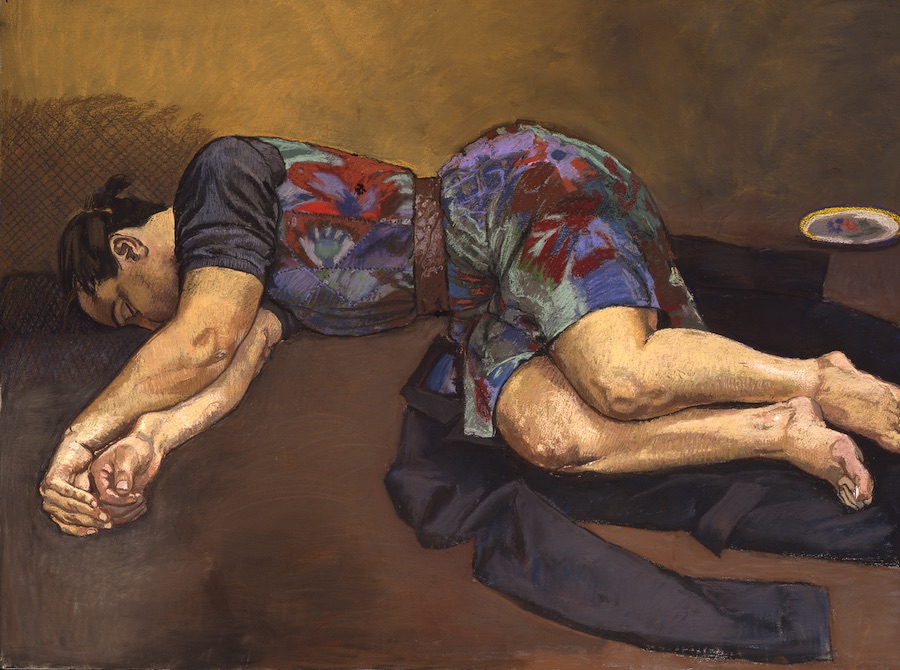
Sleeper (Dog Woman). 1994. Pastel on canvas. Copyright Paula Rego, Courtesy Marlborough Fine Art.
In 1959, you discovered the author Henry Miller through his book “Tropic of Cancer”. What fascinated you so much about this piece of literature?
I was working in the studio in Charlotte street in Soho when I was expecting my second daughter Vicky. I was working like mad. In that studio, I noticed there was a book and it was by Henry Miller. I read it and I thought, my God, this is naughty, and I loved it so much. It was published by the Olympia press in Paris so Vic and I ordered all the new publications. Most of them were pornography but they also published the books that were banned like ‘Lady Chatterly’s lover’. It was very useful. I thought eroticism was very important for art, for making pictures for some reason. At least it was for me.
What is the relationship between your paintings and literature?
It is very important because I use stories. I don’t illustrate them but maybe I become one of the figures, I identify with them and am able to tell my own story. In fact, after a while it does become my own story, the story completely changes and becomes something else so in the end it’s the picture that tells the story and not the book.
When you convey the duality of the human condition between good and evil in a stark way, what are you searching for: empathy, redemption...?
Neither of those things. I’m just making a story, painting a picture. I’m not trying to say I’m sorry about anything because I never am. Though some picture are there to take revenge. My picture of the angel does this. She’s an avenging and savior angel. The inspiration came from “The Crime of father Amaro” by Eca, when the poor girl has a baby and father Amaro sends the baby to be destroyed by ‘the maker of angels’, which is what he calls the woman in the book, and this angel was going to save the baby, or rather, it was going to kill the priest.
You have also stated that the symbolic representation of animals as people is to transmit more drama and at times, more tenderness to the scene, can you explain this?
No, it just happens. Sometimes animals are better characters to play the roles. They are less sentimental.
What do you think when you see the result of this fusion of fantasy and personal experiences?
There doesn’t seem to be any difference between one and the other. It’s the picture that counts and the picture that tells the story in the end.
Why have you focused your discourse on women?
Because I am one and because they had a hard time. They had a hard time in Portugal and in England. They had a hard time everywhere. Men were paid more and women got pregnant.
Are you a feminist?
Yes, unknowingly.
What do you want to portray to the world about women through your art?
I just want to defend them and to tell it how it is.
- Details
- Written by Elena Cué
Marina Abramovic (Belgrade, 1946) is one of the greatest representatives of performance art today. Among her next projects are directing the opera Seven Deaths dedicated to Maria Callas in Covent Garden and preparing for her forthcoming exhibition at the Royal Academy of Arts in London, becoming the first living artist to exhibit in the prestigious institution after Hockney, Kiefer, Ai WeiWei and Kapoor. With the help of artist Adam Lowe she is creating the pieces for the exhibition. "I am 71 years old, in the latter years of my life and I am very conscious about making this transition. I think when you die you do not go into the darkness but into the light. What we are going to try to create is a way to make me disappear into the light. The artist tells me this before we begin our conversation while I observe some of her works with translucent qualities that allow us a glimpse of life and death at the same time.
Author: Elena Cué
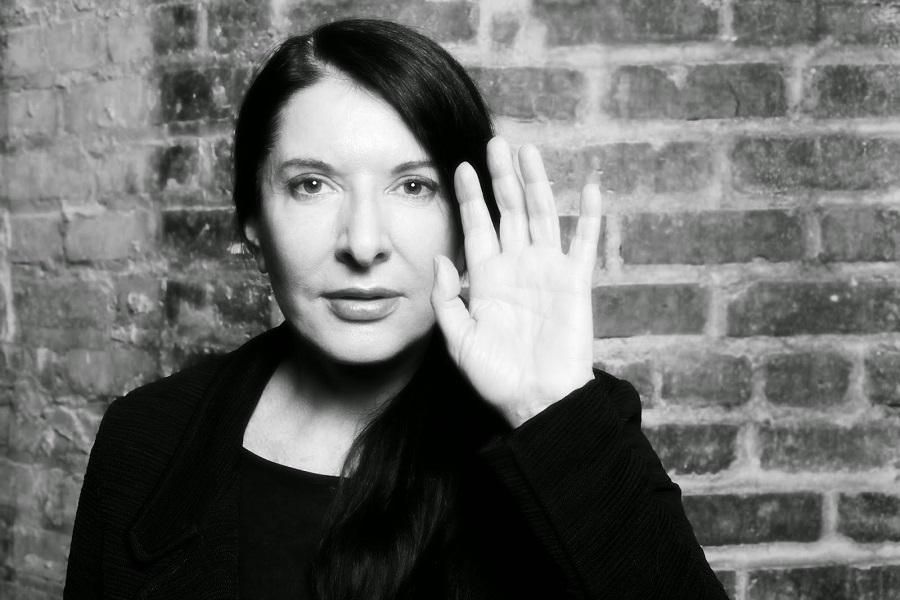
Marina Abramovic. Photo: David Leyes
Marina Abramovic (Belgrade, 1946) is one of the greatest representatives of performance art today. Among her next projects are directing the opera Seven Deaths dedicated to Maria Callas in Covent Garden and preparing for her forthcoming exhibition at the Royal Academy of Arts in London, becoming the first living artist to exhibit in the prestigious institution after Hockney, Kiefer, Ai WeiWei and Kapoor. With the help of artist Adam Lowe she is creating the pieces for the exhibition. "I am 71 years old, in the latter years of my life and I am very conscious about making this transition. I think when you die you do not go into the darkness but into the light. What we are going to try to create is a way to make me disappear into the light. The artist tells me this before we begin our conversation while I observe some of her works with translucent qualities that allow us a glimpse of life and death at the same time.
You grew up in Belgrade where your parents occupied important posts in Marshal Tito’s Communist Regime. They were prominent partisans who fought in World War II against the Axis Powers and were later proclaimed as national heroes. How do these particular circumstances manifest themselves in you and in your art?
I have to add one more component, my grandmother. My parents were busy with their careers so they just left me with her. My grandmother hated communism and Tito. She was extremely spiritual so until I was six years old I spent most of my time with her in church. My great-uncle was proclaimed a saint so I had a family that mixed both the orthodox religion and communism which is conflicting in itself. I grew up in that contradiction and my work expresses it best. At that time, I was educated not to think about my personal life. I was taught everything that is important points towards a higher purpose in your life.
What lessons were those?
My mother taught me absolute discipline while from my father I learned about heroism and not to be afraid of anybody or anything. Later on, I needed to rebel against everyone and be myself. I took the heroism, discipline, self-control and spirituality and I started to become interested in Buddhism. A mixture of all these contradictions has been reflected in my work.
In your memoir “Walk through walls” you mention that you grew up in a violent environment due to the complicated marriage of your parents. Is there any relationship between those experiences and many of your performances where violence is present?
I was never actually interested in violence itself. I like to stage painful situations in front of an audience because we are afraid of pain, mortality and suffering in our lives. By understanding pain you free yourself of the fear of pain. This was the idea. In old cultures, every single ceremony involves physical pain as it is the door to elevated consciousness that opens your mind in a different way. Even if I cut myself in the kitchen while cutting an onion, I cry like a baby but in front of an audience the blood becomes the color, the skin becomes the canvas and the knife becomes an instrument. I completely transform it into something else.
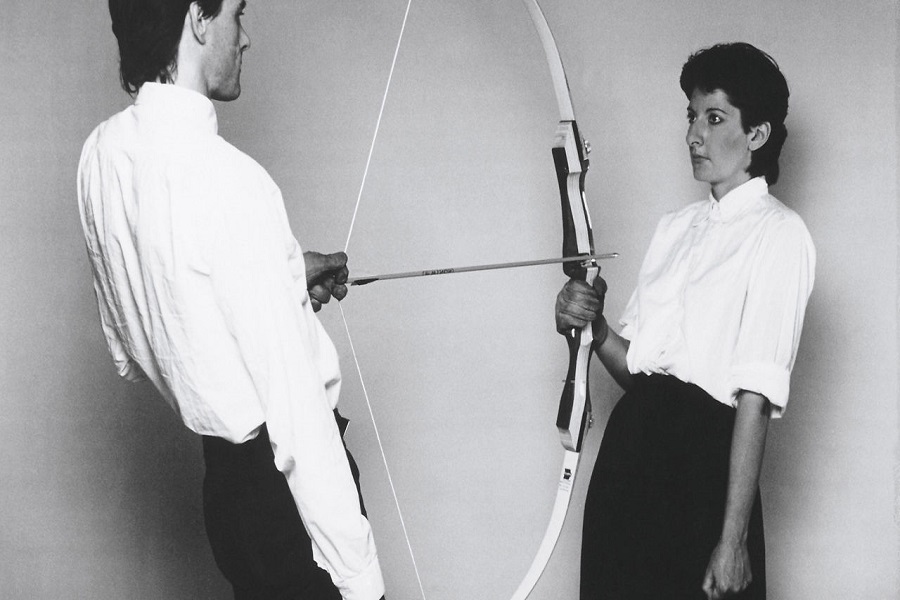
Rest Energy (1980).
There is a therapy called "paradoxical intention" that consists of inducing the patient to face his or her fear as a method of healing.
This is absolutely how I see life! We pity ourselves and it is nonsense. We have an incredible energy inside ourselves but we just do not use it. What I do is show the public that if I can do it, they can do it too. I want to be their mirror. We are so much stronger, especially us women, because we have the power to create life. We seem weak but we have that incredible power so if we play the role of being submissive, fragile and servants to men, it is because their love is very important to us. This is why I never say I am a feminist. Why should I? I already have the power.
What differentiates real life from your performances?
It is complicated to explain but when you are in your normal life, you are one person and when you step in front of the public, you use the energy of the audience which you do not normally have. That energy gives you possibilities to transcend fear and do things that you would not have the energy, courage and strength to do otherwise. It can be applied to every performance. An audience of three hundred thousand people creates an enormous amount of energy that goes through you. When the curtain falls, you simply collapse because your own energy is not enough.
How do you channel your energy when you are not creating?
Amazingly! In every molecule of our bodies we have extra energy that we never use. We only use it in a moment of total danger. I learned how to use that type of energy in front of the audience without having any kind of danger. This is the transition you make from an ordinary-self to a super-self.
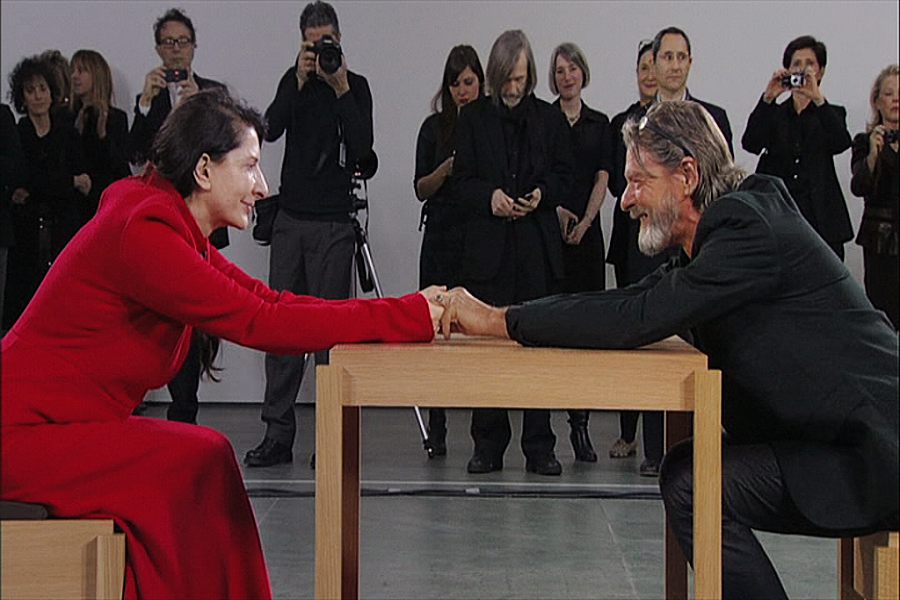
Reencuentro con Ulay en The artist is present (2010)
You discovered that your body was the tool you wanted to use to create art. What meaning do you give to the continuous exposure of your naked body?
The most natural state of the human body is the naked body, look at Adam and Eve. I do not really care about aging. I had a 70s performance in the Guggenheim for seven days. I was naked there and I was 60 at the time. We cannot escape the aging body. I started getting grey hair when I was 25 after the performance of Rhythm 0 when people almost killed me and since then I have decided I do not like gray hair.
What do you think about the concept of being the artist and the piece of art at the same time?
It took 50 years of my career for people to stop asking me why performance is art as it is not conventional. People tell you that you are a masochist, a sadist, an exhibitionist, that it is nonsense, not art. Performance art was only watched by your circle of friends. Now there are hundreds of thousands of people watching. Artist is present was seen by 17 million people on Facebook.
All great things require a lot of suffering and effort.
There is lots of sacrifice, lots of loneliness and lots of hell. You have to wake up every morning with ideas and know that your DNA is artistic. If we look at the history of art, it took El Greco 100 years, for instance, until people recognized him as an artist.
How was the transition from your very strict upbringing in Belgrade to the complete freedom of Amsterdam when you moved there at the age of 29?
It was hell because I was so used to restrictions as my work was built around restrictions and how to break them. In Holland, no one cared if you are naked or not. It was the hippy era and I was terrified as I did not know what to do with all that freedom. I had to construct my own restrictions for my work. It is very hard to sustain a career of 55 years because you always have to be as curious as a child, reinvent yourself and have the spirit of the time you are living in. I hate it when artists from my generation become tired, depressed and complain about art being dead. It is nonsense. Art is intrinsic to the human being, it is impossible for it to die.
What would you tell those artists?
I think that artists have to be erotic and sexual. They have to love food, life, relationships. That is what I love about life.
What about freedom?
Freedom is hard to achieve and you constantly have to recapture it. You have to make mistakes, learn from them and venture into new territories with the risk of getting lost. My favorite story is that of Columbus who discovered America by trying to find a new route to Asia. The fact that he embarked on that journey was more courageous than someone who went to the moon with the help of technology. Every human being should find a new way to discover their own America.
Columbus was going to the Orient but stumbled upon the West. Are you closer to the Western belief of the body-mind duality or to the Eastern belief, in which they form a whole?
Definitely the Eastern. You have to be harmonious. I think the Western approach is quite wrong because we never make an effort to understand what an extra sense of perception means. When we get sick, we just take pills but we don't look into the cause of why we are in that condition. The global view is much more interesting to me because mind and body go together. People either live only in their body and not in their mind or in their mind but not in their body. Western society is disconnected and technology is one of the biggest reasons for this. There is nothing wrong with technology, it is our approach that is wrong. We are addicted. We would spend more time playing video games or looking at computers than communicating with another human being. This is why I created “The Abramovic Method”. I provide the public with sound-blocking headphones and lockers to put their electronics away. Once there was a 12-year old who put the headphones on and told me they are not working. He had never listened to silence.
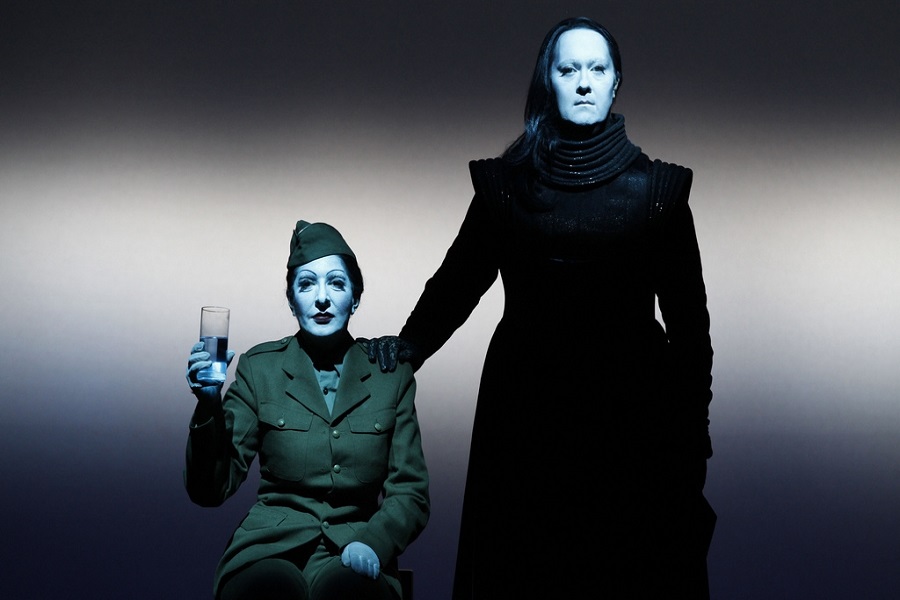
Marina Abramović y Antony en The Life and Death of Marina Abramović, www.robertwilson.com
What does such a spiritual person like you believe in?
I don't believe in Gods or religion. I really believe in energy, in divine spirit. I believe in the kind of enlightenment where you experience a complete purification of your mind and body and you lift your spirit to another level. I saw it and experienced it myself so I really believe in it.
Your art emits a lot of sexuality. How and to what extent is sexuality present in your art?
There is not just one aspect to my work there are so many layers: a social aspect, an erotic aspect, a disturbing aspect, a political aspect. I think eroticism is so important because the main energy we have in our body is sexual. Then it is up to us how we transform this sexual energy. It can be transformed through violence, war, killing, tenderness, love or spirituality. It depends how we use that energy but the fundamental, raw energy is a sexual one. Sex is as important as food. You have to eat well, have good sex; you have to live life in every single moment.
What about love?
Love has always been important in my life. I always fall in love with the wrong people, I get disappointed then I do it again. Right now I am with someone who is 21 years younger than me and it is so great that I cannot believe it is true. In our society, it is always acceptable for the woman to be younger but not the other way around. My role model is the French president’s wife who is 25 years older than he is. The press cannot accept it so they have to make him look homosexual. Society cannot accept that women can be older. I don't care about these rules. My boyfriend told me he forbids me to die before him. Love makes you so vital, so happy. Women who are 70 think everything is dead which is not true at all. The best erotic life I have had was after the menopause. So yes, sexuality is important. In my 20s, 30s and 40s I was criticized for my art, especially by men. Now in my 60s and 70s I am criticized by women. It is amazing that they think you are not supposed to look good and feel happy when you are 70. It is incredible how much hostility there is. I have always been out of the box and I will always continue to be that way. Although this is not allowed because society wants you to be a certain way.
How do you fight that hostility?
One thing that is really important in a human’s life and an artist’s life is humor. You have to learn to laugh. In order to do that you need to learn to laugh at yourself first. You should not think you are the most important person in the world. You have to put your ego aside and be humble. We are all little grains of dust in the cosmos.

